|
1931
- Lundi 29 juin 1931 : essai d'émission en anglais de minuit à 1 h 00 du matin
Les émissions anglaises sont diffusées le samedi et le dimanche
(après les
émissions françaises)
English
broadcasts are broadcast on Saturdays and Sundays (after French broadcasts)
- Dimanche 6 septembre 1931 à 22.30 (2 h) : William Evelyn Kingwell (premier présentateur britannique)
 > arrivée de Wiliam Evelyn Kingwell
(du 6 septembre au 30 décembre 1931)
> arrivée de Wiliam Evelyn Kingwell
(du 6 septembre au 30 décembre 1931)
- Dimanche 11 octobre 1931 -
1ère émission régulière en anglais / first broadcast in English : William Evelyn Kingwell
- Dimanche 15 novembre 1931 à 22.30 (3 h) : William Evelyn Kingwell
- Dimanche 22 novembre 1931 à 23.00 (2 h) : William Evelyn Kingwell
- Dimanche 29 novembre 1931 à 22.30 (3 h) : William Evelyn Kingwell
- Dimanche 6 décembre 1931 à 22.30 (1 h 30) : William Evelyn Kingwell
- Samedi 19 et dimanche 20 décembre 1931 à 19.00 (1 h) et 22.30 (3 h 30) : William Evelyn Kingwell,
and Max Stanniforth
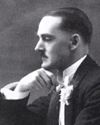 > arrivée de Max Stanniforth
(de décembre 1931 à juin 1932 - puis en novembre rejoint Radio Toulouse)
> arrivée de Max Stanniforth
(de décembre 1931 à juin 1932 - puis en novembre rejoint Radio Toulouse)
- Dimanche 27 décembre 1931 au dimanche 24 janvier 1932 à 18.30 (1 h 30) et 22.30 (4 h 30) :
Max Stanniforth
1932
Les émissions anglaises à partir de fin janvier ont lieu le samedi et le dimanche jusqu'à 3.00 du matin et dès fin février, en semaine de minuit à 1.00 du matin
English broadcasts from the end of January take place on Saturdays and
Sundays until 3:00 a.m. and from the end of February, on weekdays from
midnight to 1:00 a.m.
- Samedi 30 janvier 1932 à 00.00 (3 h) : Max Stanniforth
- Dimanche 31 janvier au dimanche 14 février 1932 à 18.30 (1 h 30) et 22.30 (0 h 30) : Max Stanniforth
. . . . . . . . . .
- Samedi 20 février 1932 à 18.30 (3 h) First Grand Goodnight : Max Stanniforth
- Dimanche 21 février 1932 à 18.30 (1 h 30) et 21.30 (5 h 30) : Max Stanniforth & Stephan Williams
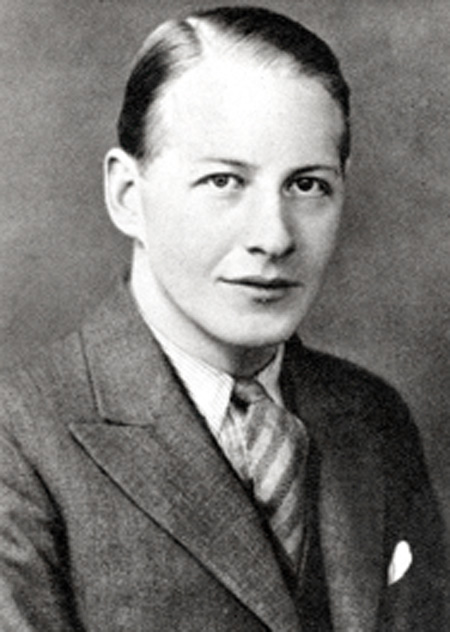 >
arrivée de
Stephen Williams
(du 21 février 1932 à 1932) ensuite partira à Radio Paris et rejoindra Radio Luxembourg
>
arrivée de
Stephen Williams
(du 21 février 1932 à 1932) ensuite partira à Radio Paris et rejoindra Radio Luxembourg
- Samedi 27 février 1932 à 00.00 (3 h) : Max Stanniforth & Stephan Williams
. . . . . . . . . .
- Lundi 29 février au vendredi 4 mars 1932 à 12.00 (1 h) : Max Stanniforth & Stephan Williams
. . . . . . . . . .
- Dimanche 5 juin 1932 à 14.00 (1 h) et 23.00 (2 h) : Max Stanniforth & Stephan Williams
. . . . . . . . . .
1933
A partir
d'avril 1933, les émissions anglaises sont effectuées chaque jour de la
semaine
From April
1933, English broadcasts were made every weekday.
. . . . . . . . . .
- Dimanche 2 avril 1933 à 16.00 (11 h) : Bob Danvers-Walker
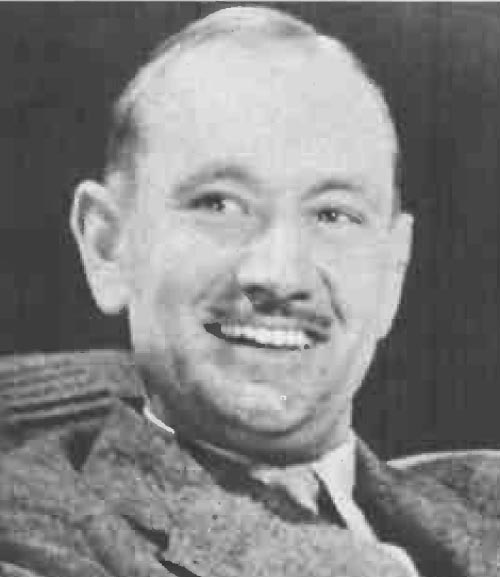 >
arrivée de
Bob Danvers-Walker
(d'avril 1933 à février 1936), rejoindra Radio Toulouse
>
arrivée de
Bob Danvers-Walker
(d'avril 1933 à février 1936), rejoindra Radio Toulouse
- A partir du lundi 3 avril 1933 à 17.00 (10 h) : Benjie MacNabb, Frank Lamping
(A partir de maintenant, les émissions ont lieu chaque jour de la semaine)
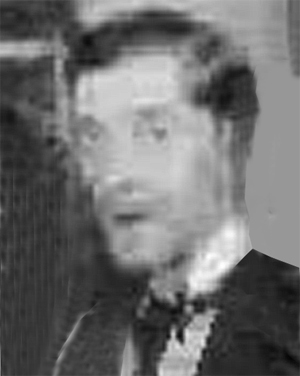 >
arrivée de
Frank Lamping
(avril 1933) - (sorry for the photo) >
arrivée de
Frank Lamping
(avril 1933) - (sorry for the photo)
 >
arrivée de
Benjie McNabb
(d'avril 1933 à février 1935)
>
arrivée de
Benjie McNabb
(d'avril 1933 à février 1935)
. . . . . . . . . .
1934
. . . . . . . . . .
- Dimanche 21 janvier 1934 à 8.45 (5 h 15) : Tom Ronald et Benjie McNabb
- Lundi 22 au samedi 27 janvier 1934 à 11.00 (1 h) ; à 15.30 (2 h 30) ; 22.00 (4 h) : John F. Sullivan & Max
Stanniforth
- Dimanche 28 janvier 1934 à 8.45 (5 h 15) : Tom Ronald et Benjie McNabb
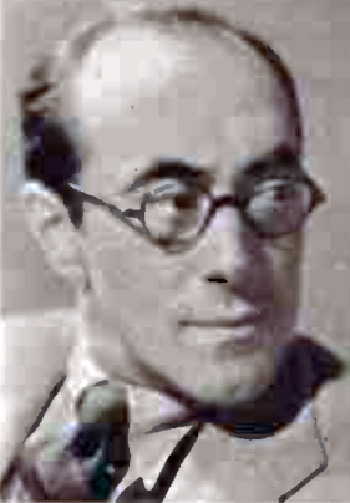 >
arrivée de
Tom Ronald
(du 21 janvier 1934 à septembre 1934)
>
arrivée de
Tom Ronald
(du 21 janvier 1934 à septembre 1934)
- Lundi 29 janvier au samedi 3 février 1934
à 11.00 (1 h) ; à 15.30 (2 h 30) ; 22.00 (4 h) : John F. Sullivan & Max Stanniforth
- Dimanche 4 février 1934 à 8.45 (5 h 15) : Tom Ronald et Benjie McNabb
- A partir du lundi 5 février 1934 à 11.00 (1 h) ; à 15.30 (2 h 30) ; 22.00 (4 h) : John F. Sullivan & Max Stanniforth
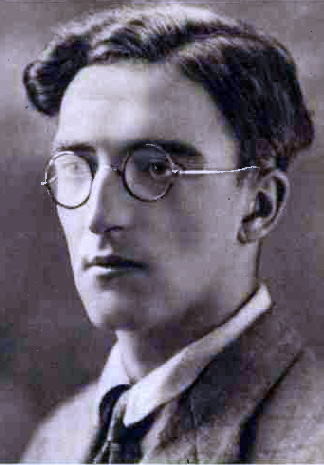 >
arrivée de
John F. Sullivan (du 22 janvier 1934 à mars 1937) ensuite rejoindra le Poste Parisien
>
arrivée de
John F. Sullivan (du 22 janvier 1934 à mars 1937) ensuite rejoindra le Poste Parisien
. . . . . . . . . .
- xx Juin 1934 : Bob Danvers-Walker, Benjie MacNabb, A. Campbell, EJ. Oestermann
. . . . . . . . . .
- 2 au 8 Septembre 1934 : T. St. A. Ronald, Benjie McNabb, John F.Sullivan
- 9 au 15 Septembre 1934 : T. St. A. Ronald, Benjie McNabb, John F.Sullivan
- 16 au 22 Septembre 1934 : Bob Danvers-Walker, Benjie McNabb, John F. Sullivan
- 23 au 29 Septembre 1934 : Bob Danvers-Walker, Benjie McNabb, John F. Sullivan
. . . . . . . . . .
- 11 au 17 novembre 1934 : Bob Danvers-Walker, Benjie McNabb, A. Campbell
 > arrivée de A. Campbell
(de janvier 1934 à avril 1935)
> arrivée de A. Campbell
(de janvier 1934 à avril 1935)
. . . . . . . . . .
- 9 au 15 décembre 1934 : Bob Danvers-Walker, Benjie MacNabb, A. Campbell
- 16 au 22 décembre 1934 : Bob Danvers-Walker, Benjie MacNabb, A. Campbell
- 23 au 29 décembre 1934 : Bob Danvers-Walker, Benjie MacNabb, A. Campbell
- 30 décembre 1934 au 5 janvier 1935 : Bob Danvers-Walker, Benjie MacNabb, A. Campbell
1935
- 6 au 12 janvier 1935 : Bob Danvers-Walker, Benjie MacNabb, A. Campbell
- 13 au 19 janvier 1935 : Bob Danvers-Walker, Benjie MacNabb, A. Campbell
- 20 au 26 janvier 1935 : Bob Danvers-Walker, Benjie MacNabb, A. Campbell
- 27 janvier au 2 février 1935 : Bob Danvers-Walker, Benjie MacNabb, A. Campbell
- 3 au 9 février 1935 : Bob Danvers-Walker, Benjie MacNabb, A. Campbell
- 10 au 16 février 1935 : Bob Danvers-Walker, Benjie MacNabb, A. Campbell
. . . . . . . . . .
- 14 avril 1935 à 8.15 : Bob Danvers-Walker (3 h 45) ; à 14.00 : A. Campbell, EJ. Oesterman (5 h)
et 21.30 : 3 h 30
- 15 au 20 avril 1935 à 8.15 : Bob Danvers-Walker (0 h 30) ; à 16.30 : A. Campbell, EJ. Oesterman (1 h 30)
et 23.00 : 2 h
. . . . . . . . . .
- 5 au 11 mai 1935 : Bob Danvers-Walker, A. Campbell, EJ. Oesterman
- 12 au 18 mai 1935 : Bob Danvers-Walker, A. Campbell, EJ. Oesterman
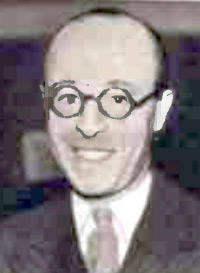 >
arrivée de
Edwin J. Oesterman
(de juin 1934 à décembre 1935)
>
arrivée de
Edwin J. Oesterman
(de juin 1934 à décembre 1935)
- 23 au 29 juin 1935 : Bob Danvers-Walker, A. Campbell, EJ. Oesterman
. . . . . . . . . .
- 21 juillet 1935 à 8.00 : Bob Danvers-Walker (4 h) ; à 14.00 : EJ. Oesterman, B. McNabb (5 h)
et 21.30 : 4 h 30
- 22 au 27 juillet 1935 à 8.00 : Bob Danvers-Walker (1 h) ; à 16.30 : EJ. Oesterman, B. McNabb (1 h 30)
et 23.00 : 3 h
. . . . . . . . . .
- 11 au 17 août 1935 : Bob Danvers-Walker, B. McNabb
- à partir du 19 août 1935 à 8.00 : Bob Danvers-Walker (1 h) ; à 16.30 : EJ. Oesterman, JW. Cummins (1 h 30)
et 23.00 : 3 h
. . . . . . . . . .
- 8 au 14 décembre 1935 : Bob Danvers-Walker, EJ. Oesterman
- 15 au 21 décembre 1935 : Bob Danvers-Walker, EJ. Oesterman
- 22 au 28 décembre 1935 : Bob Danvers-Walker, EJ. Oesterman
1936
. . . . . . . . . .
- 26 janvier au 1er février 1936 : Bob Danvers-Walker, W. Keith-Falkoner
 > arrivée de W. Keith-Falkoner
(janvier 1936)
> arrivée de W. Keith-Falkoner
(janvier 1936)
- 2 au 8 février 1936 : Bob Danvers-Walker, W. Keith-Falkoner
. . . . . . . . . .
- 14 au 20 juin 1936 : John F. Sullivan, David J. Davies, T. Melrose, Roy Plomley, Miss Leo Bailey
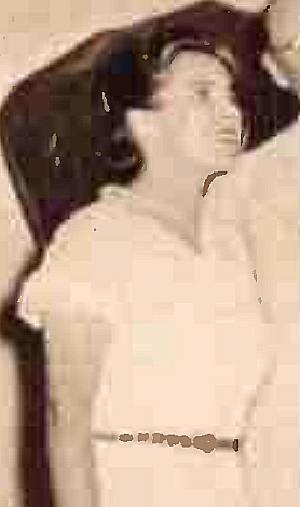 >
arrivée de
Miss Leo Bailet
(de juin 1936 à août 1936) part ensuite pour Radio Mediterranée
>
arrivée de
Miss Leo Bailet
(de juin 1936 à août 1936) part ensuite pour Radio Mediterranée
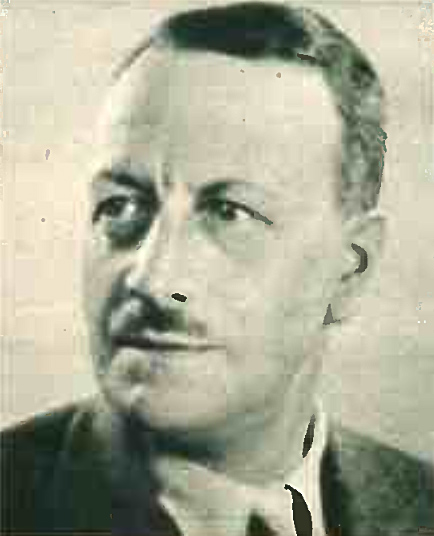 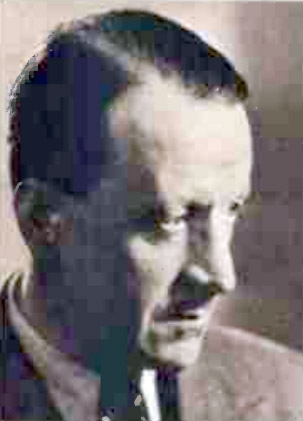 >
arrivée de
Tony Melrose (de juin 1936 à août 1936)
part ensuite sur Radio Lyon >
arrivée de
Tony Melrose (de juin 1936 à août 1936)
part ensuite sur Radio Lyon
- 21 au 27 juin 1936 : John F. Sullivan, David J. Davies, T. Melrose, Roy Plomley,
Miss Leo Bailet
- 28 juin au 4 juillet 1936 : John F. Sullivan, David J. Davies, T. Melrose, Roy Plomley,
Miss Leo Bailet
- 5 au 11 juillet 1936 : John F. Sullivan, David J. Davies, T. Melrose, Roy Plomley,
Miss Leo Bailet (à confirmer)
- 12 au 18 juillet 1936 : John F. Sullivan, David J. Davies, T. Melrose, Roy Plomley,
Miss Leo Bailet (à confirmer)
- 19 au 25 juillet 1936 : John F. Sullivan, David J. Davies, T. Melrose, Roy Plomley,
Miss Leo Bailet (à confirmer)
- 26 juillet au 1er août 1936 : John F. Sullivan, David J. Davies, T. Melrose, Roy Plomley,
Miss Leo Bailet
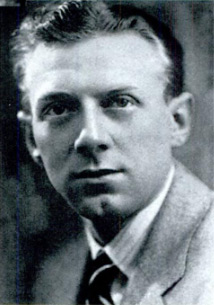 >
arrivée de
David J. Davies studio manager
(de juin 1936 au 8 septembre 1939)
>
arrivée de
David J. Davies studio manager
(de juin 1936 au 8 septembre 1939)
. . . . . . . . . .
- 9 au 15 août 1936 : John F. Sullivan, David J. Davies, Roy Plomley, John B Selby
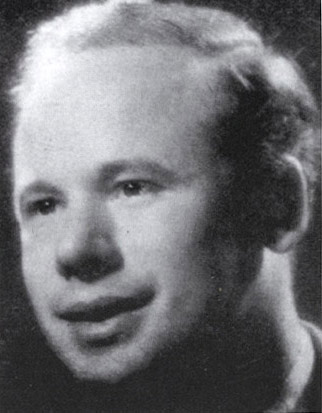 > arrivée de Roy Plomley
(de juin 1936 à novembre 1936 à Fécamp)
> arrivée de Roy Plomley
(de juin 1936 à novembre 1936 à Fécamp)
- 16 au 22 août 1936 : John F. Sullivan, David J. Davies, Roy Plomley, John B Selby (à confirmer)
- 23 au 29 août 1936 : John F. Sullivan, David J. Davies, Roy Plomley, John B Selby (à confirmer)
- 30 août au 5 septembre 1936 : John F. Sullivan, David J. Davies, Roy Plomley, John B Selby (à confirmer)
- 6 au 12 septembre 1936 : John F. Sullivan, David J. Davies, Roy Plomley, John B Selby (à confirmer)
- 13 au 19 septembre 1936 : John F. Sullivan, David J. Davies, Roy Plomley, John B Selby (à confirmer)
- 20 au 26 septembre 1936 : John F. Sullivan, David J. Davies, Roy Plomley, John B Selby (à confirmer)
- 27 septembre au 3 octobre 1936 : John F. Sullivan, David J. Davies, Roy Plomley, John B Selby
 > arrivée de John B. Selby (photo de 1943) (du 9 août à début octobre 1936)
> arrivée de John B. Selby (photo de 1943) (du 9 août à début octobre 1936)
- 4 au 10 octobre 1936 : David J. Davies, JR Fellowes, Roy Plomley, John F. Sullivan
 > arrivée de J. Robert L. Fellowes
(4 octobre 1936 à mars 1937)
> arrivée de J. Robert L. Fellowes
(4 octobre 1936 à mars 1937)
- 11 au 17 octobre 1936 : David J. Davies, JR Fellowes, Roy Plomley, John F. Sullivan
- 18 au 24 octobre 1936 : David J. Davies, JR Fellowes, Roy Plomley, John F. Sullivan
- 25 au 31 octobre 1936 : David J. Davies, JR Fellowes, Roy Plomley, John F. Sullivan (à confirmer)
- 1er au 7 novembre 1936 : David J. Davies, JR Fellowes, Roy Plomley, John F. Sullivan
- 8 au 14 novembre 1936 : David J. Davies, JR Fellowes, Roy Plomley, John F. Sullivan
- 15 au 21 novembre 1936 : David J. Davies, JR Fellowes, Roy Plomley, John F. Sullivan (à confirmer)
- 22 au 28 novembre 1936 : David J. Davies, JR Fellowes, Roy Plomley, John F. Sullivan
. . . . . . . . . .
- 6 au 12 décembre 1936 : David J. Davies, JRL Fellowes, Howard V. Gee, John F. Sullivan
 > arrivée de Howard V. Gee
(décembre 1936)
> arrivée de Howard V. Gee
(décembre 1936)
. . . . . . . . . .
- 20 au 26 décembre 1936 : David J. Davies, JRL Fellowes, Howard V. Gee, Ian Newman, John F. Sullivan
- 27 déc 1936 au 2 janvier 1937 : David J. Davies, JRL Fellowes, Howard V. Gee, Ian Newman, John F. Sullivan
 >
arrivée de
David
Ian Newman
(du 20 décembre 1936 au 8 septembre 1939)
>
arrivée de
David
Ian Newman
(du 20 décembre 1936 au 8 septembre 1939)
1937
- 3 au 9 janvier 1937 : David J. Davies, JRL Fellowes, Howard V. Gee, Ian Newman, John F. Sullivan
. . . . . . . . . .
- 31 janvier au 6 février 1937 : David J. Davies, Howard V. Gee, Ian Newman, John F. Sullivan
. . . . . . . . . .
- 14 au 20 mars 1937 : David J. Davies, J. Robert L. Fellowes, Ian Newman, John F. Sullivan
. . . . . . . . . .
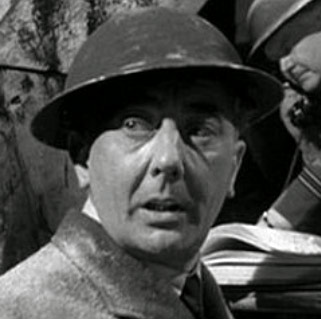 > arrivée de
Wilfrid Thorp Devereux
(de mai à décembre 1937) > arrivée de
Wilfrid Thorp Devereux
(de mai à décembre 1937)
- 2 au 8 mai 1937 : David J. Davies, Thorp Devereux, Kenneth Maconochie, Ian Newman
 > arrivée de Kenneth Maconochie
[ou Maconachie]
(du 2 mai 1937 à octobre 1937)
> arrivée de Kenneth Maconochie
[ou Maconachie]
(du 2 mai 1937 à octobre 1937)
- 9 au 15 mai 1937 : David J. Davies, Thorp Devereux, Kenneth Maconochie, Ian Newman
- 16 au 22 mai 1937 : David J. Davies, Thorp Devereux, Kenneth Maconochie, Ian Newman
. . . . . . . . . .
- 4 au 10 juillet 1937 : David J. Davies, Thorp Devereux, Kenneth Maconochie, Ian Newman
- 11 au 17 juillet 1937 : David J. Davies, Thorp Devereux, Kenneth Maconochie, Ian Newman
- 18 au 24 juillet 1937 : David J. Davies, Thorp Devereux, Kenneth Maconochie, Ian Newman
- 25 au 31 juillet 1937 : David J. Davies, Thorp Devereux, Kenneth Maconochie, Ian Newman
- 1er au 7 août 1937 : David J. Davies, Thorp Devereux, Kenneth Maconochie, Ian Newman
- 8 au 14 août 1937 : David J. Davies, Thorp Devereux, Kenneth Maconochie, Ian Newman
- 15 au 21 août 1937 : David J. Davies, Thorp Devereux, Kenneth Maconochie, Ian Newman
- 22 au 28 août 1937 : David J. Davies, Thorp Devereux, Kenneth Maconochie, Ian Newman
- 29 août au 4 septembre 1937 : David J. Davies, Thorp Devereux, Kenneth Maconochie, Ian Newman
- 5 au 11 septembre 1937 : David J. Davies, Thorp Devereux, Kenneth Maconochie, Ian Newman
- 12 au 18 septembre 1937 : David J. Davies, Thorp Devereux, Kenneth Maconochie, Ian Newman
 > arrivée de W. Stuart-Saunders
(de septembre 1937 à janvier 1938)
> arrivée de W. Stuart-Saunders
(de septembre 1937 à janvier 1938)
- 19 au 25 sept 1937 : David J. Davies, Thorp Devereux, Kenneth Maconochie, Ian Newman, W Stuart-Saunders
- 26 sept 1937 au 2 oct : David J. Davies, Thorp Devereux, Kenneth Maconochie, Ian Newman, W Stuart-Saunders
. . . . . . . . . .
- 17 au 23 octobre 1937 : David J. Davies, Thorp Devereux, Ian Newman, W Stuart-Saunders
- 24 au 30 octobre 1937 : David J. Davies, Thorp Devereux, Ian Newman, W Stuart-Saunders
- 31 octobre au 6 novembre 1937 : David J. Davies, Thorp Devereux, Ian Newman, W Stuart-Saunders
- 7 au 13 novembre 1937 : David J. Davies, Thorp Devereux, Ian Newman, W Stuart-Saunders
- 14 au 20 novembre 1937 : David J. Davies, Thorp Devereux, Ian Newman, W Stuart-Saunders
. . . . . . . . . .
- 5 au 11 décembre 1937 : David D. Davies, Godfrey Bowen, Thorp Devereux, Ian Newman, W. Stuart-Saunders
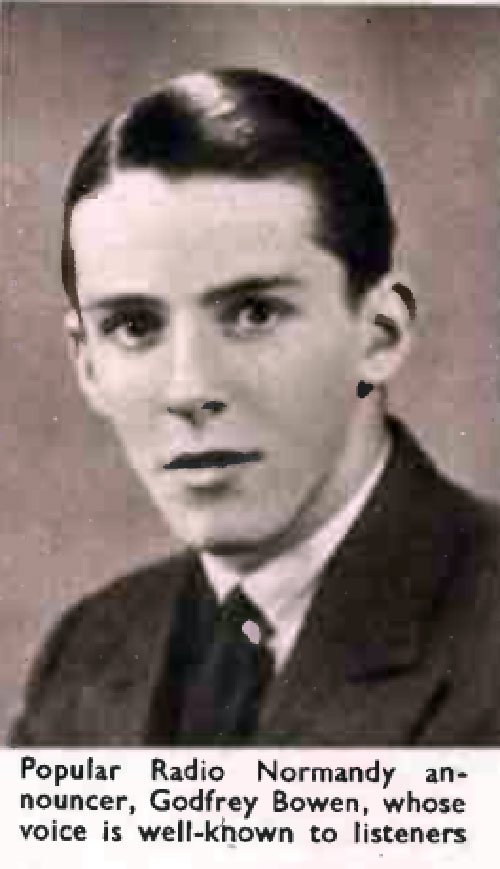 >
Godfrey Bowen
dont la voix était bien connue des auditeurs (du 5 décembre 1937 au 7 janvier 1939)
>
Godfrey Bowen
dont la voix était bien connue des auditeurs (du 5 décembre 1937 au 7 janvier 1939)
- 12 au 18 décembre 1937 : David D. Davies, Godfrey Bowen, Thorp Devereux, Ian Newman, W. Stuart-Saunders
- 19 au 25 décembre 1937 : David D. Davies, Godfrey Bowen, Thorp Devereux, Ian Newman, W. Stuart-Saunders
- 26 décembre 1937 au 1er janvier 1938 : David D. Davies, Godfrey Bowen, Thorp Devereux, Ian Newman,
W. Stuart-Saunders
1938
- 1er au 8 janvier 1938 : David J. Davies, Godfrey Bowen, Thorp Devereux, Ian Newman, W. Stuart-Saunders
- 9 au 15 janvier 1938 : David J. Davies, Godfrey Bowen, Thorp Devereux, Ian Newman, W. Stuart-Saunders
. . . . . . . . . .
- 23 au 29 janvier 1938 : David J. Davies, Godfrey Bowen, Ian Newman
- 30 janvier au 5 février 1938 : David J. Davies, Godfrey Bowen, Ian Newman
- 6 au 12 février 1938 : David J. Davies, Godfrey Bowen, Ian Newman
- 13 au 19 février 1938 : David J. Davies, Godfrey Bowen, Ian Newman, Hilary Wontner
. . . . . . . . . .
- 13 au 19 mars 1938 : David J. Davies, Godfrey Bowen, Ian Newman, Hilary Wontner
- 20 au 26 mars 1938 : David J. Davies, Godfrey Bowen, Ian Newman, Hilary Wontner
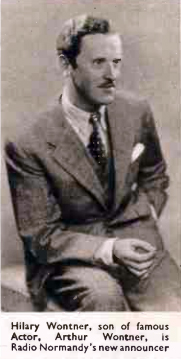 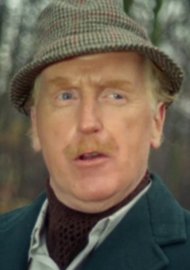 >
arrivée de
Hilary Wontner
(du 13 février 1938 au 7 mai 1938)
>
arrivée de
Hilary Wontner
(du 13 février 1938 au 7 mai 1938)
- 27 mars au 2 avril 1938 : David J. Davies, Godfrey Bowen, Ian Newman, Hilary Wontner
- 3 au 9 avril 1938 : David J. Davies, Godfrey Bowen, Ian Newman, Hilary Wontner
- 10 au 16 avril 1938 : David J. Davies, Godfrey Bowen, Ian Newman, Hilary Wontner
- 17 au 23 avril 1938 : David J. Davies, Godfrey Bowen, Ian Newman, Hilary Wontner
- 24 au 30 avril 1938 : David J. Davies, Godfrey Bowen, Ian Newman, Hilary Wontner
- 1er au 7 mai 1938 : David J. Davies, Godfrey Bowen, Ian Newman, Hilary Wontner
- 8 au 14 mai 1938 : Ian Newman, Godfrey Bowen, Norman Evans
- 15 au 21 mai 1938 : Ian Newman, Godfrey Bowen, Norman Evans
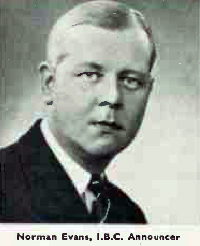 >
arrivée de
Norman Evans
(du 8 mai 1938 au 29 avril 1939)
>
arrivée de
Norman Evans
(du 8 mai 1938 au 29 avril 1939)
- 22 au 28 mai 1938 : Ian Newman, Godfrey Bowen, Norman Evans
- 29 mai au 4 juin 1938 : Ian Newman, Godfrey Bowen, Norman Evans
- 5 au 11 juin 1938 : Ian Newman, Godfrey Bowen, Norman Evans, George R. Busby (studio manager),
David J. Davies (Transmission controler), Clifford Sandall & Vivian Gale (Ingénieurs du son / Technical staff)
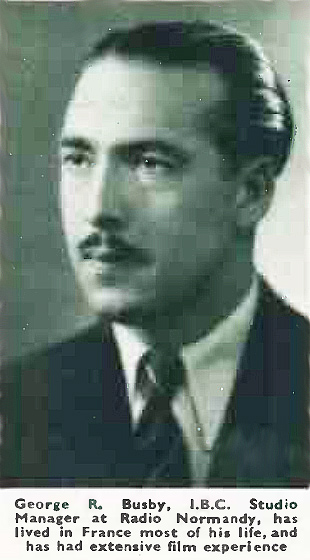 > arrivée de George R. Busby (chef d'antenne)
> arrivée de George R. Busby (chef d'antenne)
- 12 au 18 juin 1938 : Ian Newman, Godfrey Bowen, Norman Evans
- 19 au 25 juin 1938 : Ian Newman, Godfrey Bowen, Norman Evans
- 26 juin au 2 juillet 1938 : Ian Newman, Godfrey Bowen, Norman Evans, Henry Cuthbertson
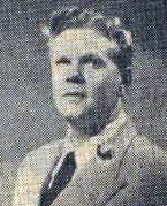 >
arrivée de
Henry Cuthbertson (photo de 1954) (de juin 1938 à octobre 1938)
>
arrivée de
Henry Cuthbertson (photo de 1954) (de juin 1938 à octobre 1938)
- 3 au 9 juillet 1938 : Ian Newman, Godfrey Bowen, Norman Evans, Henry Cuthbertson
Ingénieurs du son / Technical staff : Clifford Sandall, Vivian Gale
- 10 au 16 juillet 1938 : Ian Newman, Godfrey Bowen, Norman Evans, Henry Cuthbertson
- 17 au 23 juillet 1938 : Ian Newman, Godfrey Bowen, Norman Evans, Henry Cuthbertson
- 24 juillet au 6 août 1938 : Ian Newman, Godfrey Bowen, Norman Evans, Henry Cuthbertson
- 7 au 13 août 1938 : Ian Newman, Godfrey Bowen, Norman Evans, Henry Cuthbertson
- 14 au 20 août 1938 : Ian Newman, Godfrey Bowen, Norman Evans, Henry Cuthbertson
- 21 au 27 août 1938 : Ian Newman, Godfrey Bowen, Norman Evans, Henry Cuthbertson
- 28 août au 3 septembre 1938 : Ian Newman, Godfrey Bowen, Norman Evans, Henry Cuthbertson
- 4 au 10 septembre 1938 : Ian Newman, Godfrey Bowen, Norman Evans, Henry Cuthbertson
- 11 au 17 septembre 1938 : Ian Newman, Godfrey Bowen, Norman Evans, Henry Cuthbertson
- 18 au 24 septembre 1938 : Ian Newman, Godfrey Bowen, Norman Evans, Henry Cuthbertson
- 25 septembre au 2 octobre 1938 : Ian Newman, Godfrey Bowen, Norman Evans, Henry Cuthbertson
- 2 au 8 octobre 1938 : Ian Newman, Godfrey Bowen, Norman Evans, Henry Cuthbertson
- 9 au 15 octobre 1938 : Ian Newman, Godfrey Bowen, Norman Evans, Henry Cuthbertson
- 16 au 22 octobre 1938 : Ian Newman, Godfrey Bowen, Norman Evans, Henry Cuthbertson
- 23 au 29 octobre 1938 : Ian Newman, Godfrey Bowen, Norman Evans, Henry Cuthbertson
Ingénieurs du son / Technical staff : Clifford Sandall, Vivian Gale
. . . . . . . . . .
- 13 au 19 novembre 1938 : IBC Studio Manager : George R. Busby ; Transmission Controller : David J. Davies
Resident announcers : Ian Newman, Godfrey Bowen, Norman Evans, Graham Wilson
Ingénieur du son / Technical staff : Clifford Sandall
- 20 au 26 novembre 1938 : IBC Studio Manager : George R. Busby ; Transmission Controller : David J. Davies
Resident announcers : Ian Newman, Godfrey Bowen, Norman Evans, Henry Cuthbertson
Ingénieur du son / Technical staff : Clifford Sandall, Vivian Gale
. . . . . . . . . .
- 4 au 11 décembre 1938 : David J. Davies, Ian Newman, Godfrey Bowen, Norman Evans
- 12 décembre 1938 - dernier jour à Fécamp : David J. Davies, Ian Newman, Godfrey Bowen, Norman Evans
|
|
Caudebec
Planning des speakers britanniques résidents à Caudebec-en-Caux
du 13 décembre 1938 au 7/8 septembre 1939
Schedule of British announcers resident in
Caudebec-en-Caux
from December 13, 1938 to September 7/8, 1939
Les présentateurs britanniques "en poste" à Caudebec à partir du 13 décembre 1938 jusqu'au 8 septembre 1939, étaient chargés de l'enchaînement des programmes pré-enregistrés à Londres et de faire des annonces inter-programmes le cas échéant.
Nos sources : Tableaux reconstitués d'après les grilles de programmes publiées par "Radio Pictorial" à consulter ici :
https://worldradiohistory.com/Radio_Pictorial.htm
" |
The British presenters "on station" in Caudebec from December 13, 1938 until September 8, 1939, were responsible for linking the programs previously recorded in London and making inter-program announcements where necessary.
Our sources: Tables reconstructed from the program schedules published by "Radio Pictorial" to consult :
https://worldradiohistory.com/Radio_Pictorial.htm |
- 13 au 17 décembre 1938 : David J. Davies, Ian Newman, Godfrey Bowen, Norman Evans
Ingénieur du son / Technical staff : Clifford Sandall
- 18 au 24 décembre 1938 : David J. Davies, Ian Newman, Godfrey Bowen, Norman Evans
- 25 au 31 décembre 1938 : David J. Davies, Ian Newman, Godfrey Bowen, Norman Evans
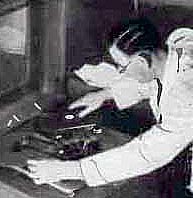 > >
Technical staff / Ingénieur du son : Clifford Sandall
(de 1938 ? au 8 septembre 1939)
1939
- 1er au 7 janvier 1939 : David J. Davies, Ian Newman, Godfrey Bowen, Norman Evans
Ingénieur du son / Technical staff : Clifford Sandall
. . . . . . . . . .
- 15 au 21 janvier 1939 : David J. Davies, Ian Newman, Ralph Hurcombe, Norman Evans
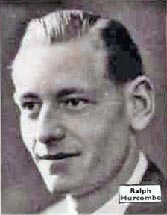 >
arrivée de
Ralph Hurcombe
(de janvier 1939 au 8 septembre 1939)
>
arrivée de
Ralph Hurcombe
(de janvier 1939 au 8 septembre 1939)
- 29 janvier au 4 février 1939 : David J. Davies, Ian Newman, Ralph Hurcombe, Norman Evans
. . . . . . . . . .
- 12 au 18 février 1939 : David J. Davies, Ralph Hurcombe, Norman Evans, Godfrey Holloway
Ingénieur du son / Technical staff : Clifford Sandall
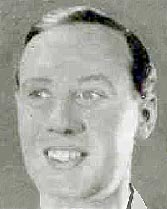 >
arrivée de
Godfrey Holloway
(du 12 février 1939 au 8 septembre 1939)
>
arrivée de
Godfrey Holloway
(du 12 février 1939 au 8 septembre 1939)
- 26 février au 4 mars 1939 : David J. Davies, Ian Newman, Ralph Hurcombe, Norman Evans, Godfrey Holloway
Ingénieur du son / Technical staff : Clifford Sandall
- 5 au 11 mars 1939 : David J. Davies, Ian Newman, Ralph Hurcombe, Norman Evans, Godfrey Holloway
Ingénieur du son / Technical staff : Clifford Sandall
- 12 au 18 mars 1939 : David J. Davies, Ian Newman, Ralph Hurcombe, Norman Evans, Godfrey Holloway
Ingénieur du son / Technical staff : Clifford Sandall
- 19 au 25 mars 1939 : David J. Davies, Ian Newman, Ralph Hurcombe, Norman Evans, Godfrey Holloway
Ingénieur du son / Technical staff : Clifford Sandall
- 26 mars au 1er avril 1939 : David J. Davies, Ian Newman, Ralph Hurcombe, Norman Evans, Godfrey Holloway
Ingénieur du son / Technical staff : Clifford Sandall
- 2 au 8 avril 1939 : David J. Davies, Ian Newman, Ralph Hurcombe, Norman Evans, Godfrey Holloway
Ingénieur du son / Technical staff : Clifford Sandall
- 9 au 15 avril 1939 : Ian Newman, David J. Davies, Ralph Hurcombe, Norman Evans, Godfrey Holloway
Ingénieur du son / Technical staff : Clifford Sandall
- 16 au 22 avril 1939 : Ian Newman, David J. Davies, Ralph Hurcombe, Norman Evans, Godfrey Holloway
Ingénieur du son / Technical staff : Clifford Sandall
- 23 au 29 avril 1939 : Ian Newman, David J. Davies, Ralph Hurcombe, Norman Evans, Godfrey Holloway
Ingénieur du son / Technical staff : Clifford Sandall
- 30 avril au 6 mai 1939 : Ian Newman, David J. Davies, Ralph Hurcombe, Godfrey Holloway
Ingénieur du son / Technical staff : Clifford Sandall
- 7 au 13 mai 1939 : Ian Newman, David J. Davies, Ralph Hurcombe, Godfrey Holloway
Ingénieur du son / Technical staff : Clifford Sandall
- 14 au 20 mai 1939 : Ian Newman, David J. Davies, Ralph Hurcombe, Godfrey Holloway
Ingénieur du son / Technical staff : Clifford Sandall
- 21 au 27 mai 1939 : Ian Newman, David J. Davies, Ralph Hurcombe, Godfrey Holloway
Ingénieur du son / Technical staff : Clifford Sandall
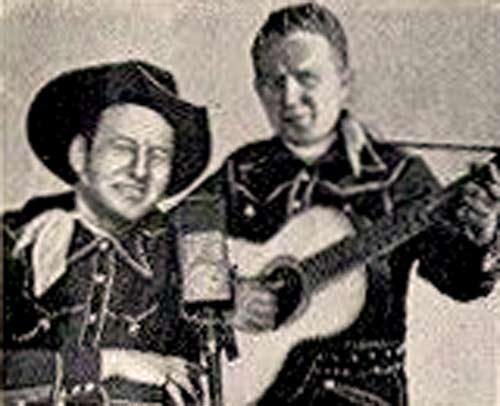
Les Singing Cowboys Ed et Don entendus durant la semaine du 28 mai au 3 juin 1939
- 28 mai au 3 juin 1939 : Ian Newman, David J. Davies, Ralph Hurcombe, Godfrey Holloway
Ingénieur du son / Technical staff : Clifford Sandall
. . . . . . . . . .
- 11 au 17 juin 1939 : Ian Newman, David J. Davies, Ralph Hurcombe, Maurice Griffith, Godfrey Holloway
Ingénieur du son / Technical staff : Clifford Sandall
 > arrivée de Maurice Griffith
(du 11 juin au 7 septembre 1939 - dernier jour)
> arrivée de Maurice Griffith
(du 11 juin au 7 septembre 1939 - dernier jour)
- 18 au 24 juin 1939 : David J. Davies, Ian Newman, Ralph Hurcombe, Maurice Griffith, Godfrey Holloway
Ingénieur du son / Technical staff : Clifford Sandall
Chef DJ et contrôleur des programmes : David J. Davies
Chef d'antenne : George R. Busby
- 25 juin au 1er juillet 1939 : David J. Davies, Ian Newman, Ralph Hurcombe, Maurice Griffith, Godfrey Holloway
Ingénieur du son / Technical staff : Clifford Sandall
- 2 au 8 juillet 1939 : Ian Newman, David J. Davies, Ralph Hurcombe, Maurice Griffith, Godfrey Holloway
Ingénieur du son / Technical staff : Clifford Sandall
- 9 au 15 juillet 1939 : Ian Newman, David J. Davies, Ralph Hurcombe, Maurice Griffith, Godfrey Holloway
Ingénieur du son / Technical staff : Clifford Sandall
- 16 au 22 juillet 1939 : Ian Newman, David J. Davies, Ralph Hurcombe, Maurice Griffith, Godfrey Holloway
Ingénieur du son / Technical staff : Clifford Sandall
- 23 au 29 juillet 1939 : Ian Newman, David J. Davies, Ralph Hurcombe, Maurice Griffith, Godfrey Holloway
Ingénieur du son / Technical staff : Clifford Sandall
- 30 juillet au 5 août 1939 : Ian Newman, David J. Davies, Ralph Hurcombe, Maurice Griffith, Godfrey Holloway
Ingénieur du son / Technical staff : Clifford Sandall
- 6 au 12 août 1939 : Ian Newman, David J. Davies, Ralph Hurcombe, Maurice Griffith, Godfrey Holloway
Ingénieur du son / Technical staff : Clifford Sandall
- 13 au 19 août 1939 : Ian Newman, David J. Davies, Ralph Hurcombe, Maurice Griffith, Godfrey Holloway
Ingénieur du son / Technical staff : Clifford Sandall
- 20 au 26 août 1939 : Ian Newman, David J. Davies, Ralph Hurcombe, Maurice Griffith, Godfrey Holloway
Ingénieur du son / Technical staff : Clifford Sandall
- 27 août au 2 sept 1939 : Ian Newman, David J. Davies, Ralph Hurcombe, Maurice Griffith, Godfrey Holloway
Ingénieur du son / Technical staff : Clifford Sandall
- 3 au 8 septembre 1939 : Ian Newman, David J. Davies, Ralph Hurcombe, Maurice Griffith, Godfrey Holloway
Ingénieur du son / Technical staff : Clifford Sandall
- - - - - - - - - - - - - - - - - - - - - - - - - - -
La dernière émission en anglais est diffusée le jeudi 7 septembre 1939 (fin à 1.00 le 8.09.1939
The last English broadcast was on Thursday September 7, 1939
(end at 1.00 on 8.09.1939)

|
William Evelyn Kingwell
(1889 - 19 janvier 1947) était un caissier de banque britannique qui, le 6 septembre 1931, fut le premier
disc-jockey à diffuser en anglais depuis la France après avoir été recruté par Leonard Plugge pour présenter des disques dans une émission du dimanche soir sur Radio Fécamp.
Le père de Kingwell l'avait destiné à une carrière dans la banque dès son plus jeune âge, carrière qu'il avait entamée avant qu'elle ne soit interrompue par la Première Guerre mondiale. Après son service de guerre, Kingwell est retourné à la banque, travaillant pour Lloyds comme caissier en chef dans une succursale de la Lloyds au Havre.
C'est à la banque que Kingwell rencontre l'entrepreneur de radio Leonard Plugge qui avait besoin d'argent pour acheter des disques de gramophone pour sa nouvelle International Broadcasting Company (IBC) et a commencé à discuter avec Kingwell. Il lui a demandé s'il connaissait quelqu'un qui pourrait présenter des disques à la radio tous les dimanches soirs et Kingwell a répondu qu'il serait heureux de faire ce travail. La première émission a eu lieu le 6 septembre 1931 en utilisant le temps d'émission que Plugge avait acheté à Radio Fécamp, faisant de Kingwell le premier "disc-jockey", un terme inventé plus tard, à émettre en anglais depuis la France.
Kingwell trouvait le travail difficile, peut-être à cause des séquelles de sa blessure au gaz pendant la guerre, et à une occasion, il a perdu sa voix et a dû demander à son fils de prendre sa place. Plus tard, il a été rejoint par le Major Max Staniforth avant d'abandonner complètement la présentation. |
William Evelyn Kingwell
(1889 - 19 January 1947) was a British bank cashier who on 6 September 1931 was the first disc jockey to broadcast in English from France after he was recruited by Leonard Plugge to introduce records on a Sunday evening show on Radio Fécamp in Normandy.
Kingwell's father had intended him for a career in banking from an early age which he had started before it was interrupted by the First World War. After his war service, Kingwell returned to banking, working for Lloyds on attachment as chief cashier at a Lloyds/National Provincial branch in Le Havre, France.
It was at the bank that Kingwell met the radio entrepreneur Leonard Plugge who needed money to buy gramophone records for his new International Broadcasting Company (IBC) and got chatting with Kingwell. He asked him if he knew anyone who could introduce records on radio every Sunday night and Kingwell replied that he would be glad to do the job. The first broadcast took place on 6 September 1931 using transmitter time that Plugge had bought from Radio Fécamp in Normandy making Kingwell the first "disc jockey", a term invented later, to broadcast in English from France.
Kingwell found the work difficult, possibly due to the after-effects of his gas injury during the war, and on one occasion lost his voice and had to get his son to take his place. Later, he was joined by Major Max Staniforth before giving up presenting entirely.
https://military-history.fandom.com/wiki/William_Evelyn_Kingwell
|

| Roy Plomley
(20.01.1914-28.05.1985) a été un producteur et un écrivain. Sur scène et au cinéma avant d'entrer en radio en 1936 comme animateur à Radio Normandie. À la fin de cette année-là, il était responsable des transmissions en anglais de Poste Parisienne. Rentré à Londres l'année suivante en tant que producteur et scénariste-écrivain dans les studios d'enregistrement d'I.B.C. À le déclenchement de la guerre, il est retourné à France pour travailler sur Radio International, et fut l'un des derniers Anglais à quitter Paris au moment de la capitulation.
Après ses études, il a travaillé dans une agence de publicité. Mais il voulait être avant tout acteur. Il fit quelques tentatives dans plusieurs films et bientôt se rapprocha du monde de la radio comme speaker et plus tard comme producteur d'émissions pour l'IBC avec Radio Normandy (1936) puis le Poste Parisien (1937). Juste avant la déclaration de guerre, il présentait le programme de variétés Radio Normandy Calling enregistré dans des salles de théâtre de la côte sud de l'Angleterre où régulièrement il battait la BBC en termes d'audience.
La fin des radios commerciales, dû à la guerre, causa un terme brutal à sa carrière. Dans la panique de la capitulation française en 1940, il regagna l'Angleterre accompagné de sa femme. En 1942, il proposa à la BBC sa série d'émissions Desert Island Discs. Chaque show consistait en une interview d'une célébrité, entrecoupée des choix musicaux de cet invité. Il a présenté cette émission durant 43 années. Cette série existe toujours en 2007 et est l'émission de radio la plus ancienne dans le monde aujourd'hui. Roy a été le président de l'association des écrivains pour la radio et la télévision et nommé "Personnalité de l'Année 1979" à la BBC. Il est décédé à l'âge de 71 ans.
Extrait du RADIO
WHO'S WHO 1947
PLOMLEY, ROY.
Acteur, animateur et écrivain. Né à Kingston-on-Thames, le 20
janvier 1914.
Auteur et producteur de plusieurs longs métrages pour la BBC.
Adresse : 507, Hawkins House, Dolphin Square, Londres, SWI.
Téléphone : Victoria 3800, poste 507. Il a joué sur scène et au
cinéma avant d’entrer à la radio en 1936 comme speaker à Radio
Normandie.
À la fin de cette année-là, il était responsable des transmissions
anglaises du Poste Parisien. Il est retourné à Londres l’année
suivante comme producteur et scénariste dans les studios
d’enregistrement d’IBC.
Au début de la guerre, il est rentré en France pour travailler à
Radio Internationale et a été l’un des derniers Anglais à quitter
Paris au moment de la capitulation, dont il a parlé dans « Le Monde
passe ». Ces dernières années, il a écrit et présenté plusieurs
séries populaires de la BBC, dont « Disques de l'île déserte », « To
Town on Two Pianos » et « Hourra for Hollywood », entre autres. Il a
également joué dans des pièces de théâtre et des longs métrages.
Marié à Diana Wong.
Hobbies : Collectionner les affiches et les livres sur l'histoire du
théâtre.
|
Roy Plomley
(1914-1985) was a producer and writer.
On stage and in films before entering radio in 1936 as station announcer at Radio Normandy. At the end of that year was in charge of English transmissions from
Poste Parisien. Returned to London the
following year as producer and script-
writer in recording studios of I.B.C. At
the outbreak of war he returned to
France to work on Radio International,
and was one of the last Englishmen to leave Paris at the time of the capitula-
tion.
After graduation, he worked in an advertising agency. But he wanted to be an actor first and foremost. He made some attempts in several films and soon approached the world of radio as an announcer and later as a producer of programs for the IBC with Radio Normandy (1936) then the Parisian Post (1937). Just before the declaration of war, he presented the variety program Radio Normandy Calling recorded in theaters on the south coast of England where he regularly beat the BBC in terms of audience.
The end of commercial radios, due to the war, caused an abrupt end to his career. In the panic of the French surrender in 1940, he returned to England accompanied by his wife. In 1942 he offered the BBC his Desert Island Discs series of broadcasts. Each show consisted of an interview with a celebrity, interspersed with that guest's musical choices. He presented this show for 43 years. This series still exists in 2007 and is the longest running radio show in the world today. Roy was the president of the Writers' Association for Radio and Television and named the BBC's 'Person of the Year 1979'. He died at the age of 71.
From
RADIO WHO'S WHO 1947
PLOMLEY, ROY. Actor, compere and writer. b. Kingston-on-Thames, 20th
January, 1914. Author and producer of several B.B.C. features.
Address: 507, Hawkins House, Dolphin Square, London, S.W.I. Phone:
Victoria 3800, extension 507. On stage and in films before entering
radio in RADIO WHO'S WHO 1936 as station announcer at Radio Normandy.
At the end of that year was in charge of English transmissions from
Poste Parisien. Returned to London the following year as producer
and scriptwriter in recording studios of I.B.C. At the outbreak of
war he returned to France to work on Radio International, and was
one of the last Englishmen to ROY PLOMLEY leave Paris at the time of
the capitulation, of which he told in " The World Goes By." In
recent years he has written and presented a number of popular B.B.C.
series, including " Desert Island Discs," "To Town on Two Pianos,"
"Hurrah for Hollywood," and others. Has also acted in drama and
feature productions. Married to Diana Wong. Hobbies: Collecting
playbills and books on theatrical history.
| 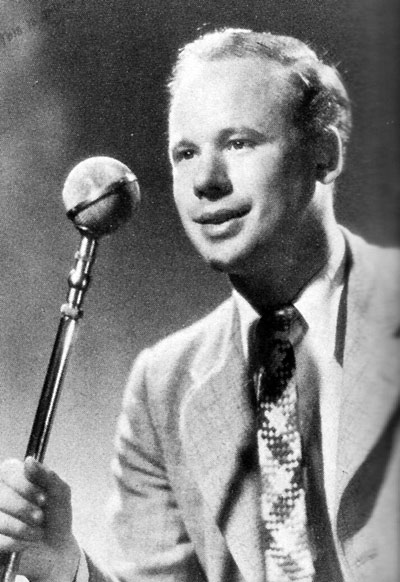
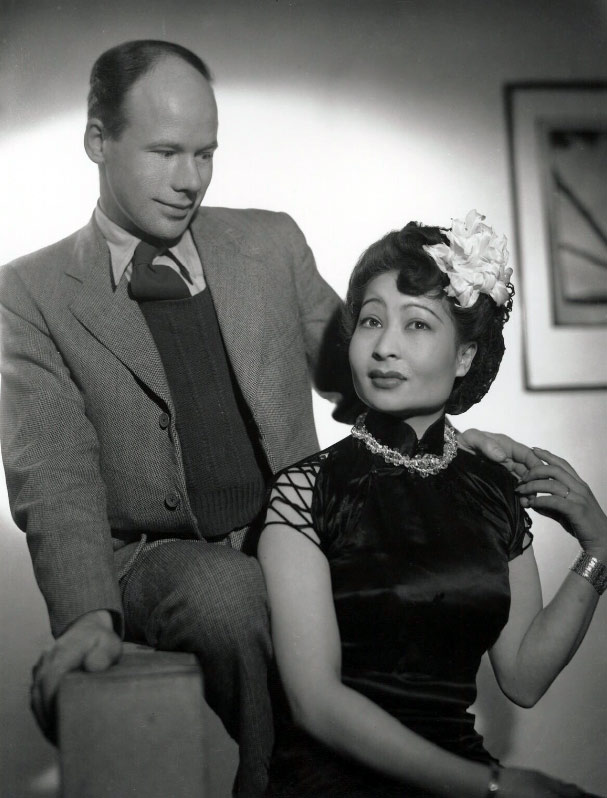
Roy Plomley et sa femme (and his wife),
l'actrice Diana Beatrice Wong (1940)
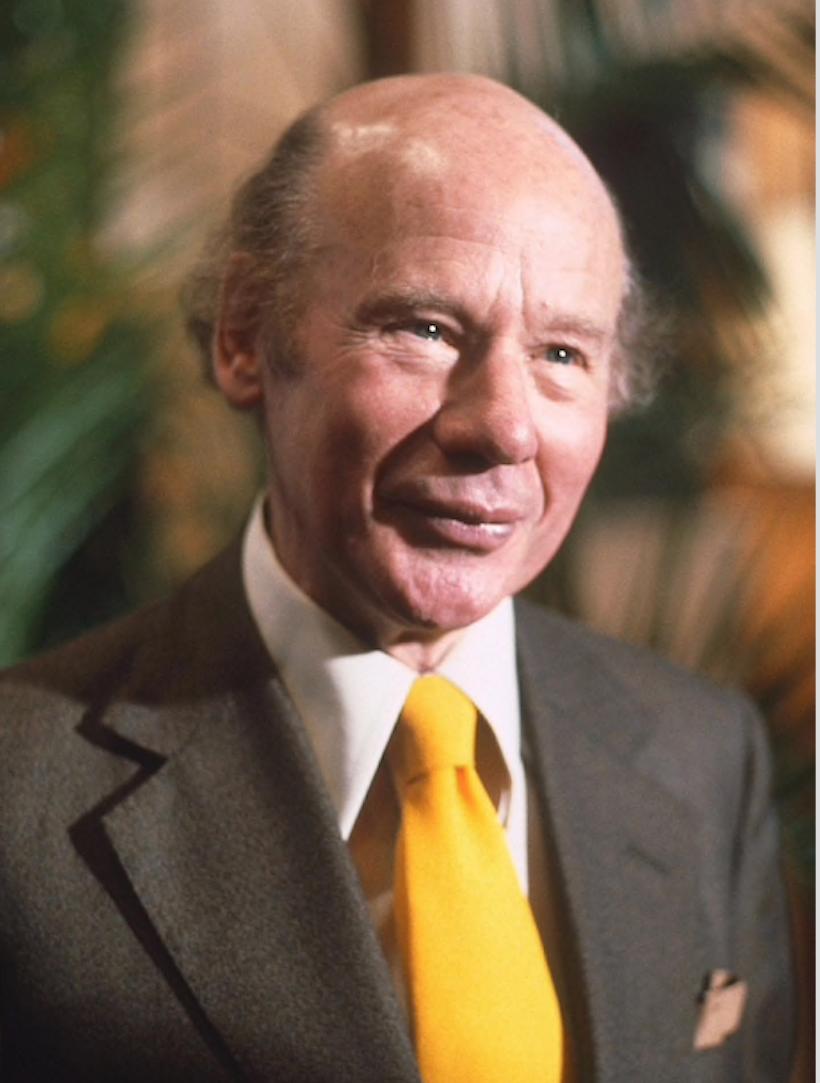
Roy Plomley
 Extrait de THE GUARDIAN Extrait de THE GUARDIAN
du 11 mars 1972 en anglais :

(cliquer sur la miniature)
| Bob Danvers-Walker
(11 octobre 1906 - 17 mai 1990) était un présentateur britannique de radio et d'actualités surtout connu comme la voix "off" des actualités britanniques Pathé News, un travail qu'il a occupé sans interruption de 1940 à 1970. Sa voix a été décrite comme "claire, fruitée et riche, avec juste une suggestion de raffinement".
Né à Cheam, dans le Surrey, Danvers-Walker était le fils de William Charles Danvers-Walker, un Australien, et de sa femme Lilian Danvers, fille de Frederick Charles Danvers. Il a utilisé le nom de famille Walker jusqu'aux années 1950. Il a passé une grande partie de son enfance en Tasmanie et a commencé sa carrière à la radio à Melbourne, en 1925, passant brièvement au 2FC à Sydney, en 1932, avant de retourner au Royaume-Uni la même année.
De 1932 à 1939, Walker a travaillé comme présentateur pour le réseau International Broadcasting Company (IBC) de stations de radio commerciales diffusant en anglais vers la Grande-Bretagne depuis le continent. Il devient chef-animateur à Radio Normandie. Il a également aidé l'IBC à mettre en place des stations de radio à Toulouse, Paris, Lyon, Madrid, Barcelone et Valence, mais Radio Normandie a toujours été la station phare de l'entreprise, et Danvers-Walker a été entendu régulièrement sur ses ondes jusqu'à la fermeture de la station au début de la guerre en 1939.
Danvers-Walker voulait ensuite rejoindre la BBC mais en a été empêché par une règle de la BBC interdisant d'employer toute personne ayant travaillé sur une radio commerciale. Cette règle a été discrètement abandonnée en 1943, et à partir de ce moment, il a été déployé sur des émissions de variétés de la BBC en temps de guerre pour remonter le moral.
Bob Danvers-Walker a également travaillé à la pige pour de nombreuses stations de radio et de télévision.
L'arrivée d'ITV (télévision commerciale) en 1955 a apporté de nouvelles opportunités, notamment en tant qu'annonceur du jeu télévisé de Michael Miles Take Your Pick ! (1955-1968) et son programme successeur, Roue de la Fortune (1969-1971). À la BBC Radio, Danvers-Walker a été l'un des présentateurs réguliers de Housewives' Choice tout au long des années 1950 et a contribué à de nombreux autres programmes, y compris dans les années 1960 Holiday Hour et Countryside. Pour BBC Television, il est régulièrement apparu dans Saturday Night Out. Il est également apparu dans un certain nombre de longs métrages, jouant son propre rôle.
Danvers-Walker est décédé le 17 mai 1990, et a laissé dans le deuil sa femme Vera Nita White, qu'il avait épousée en 1933 ; ils eurent un fils et une fille. Sur un clip audio de Radio Normandie, on entend son collègue Roy Plomley se référer à lui comme "Bob Walker", mais il a été décrit comme "C. Danvers-Walker" dans les grilles de programmes de la station imprimées dans Radio Pictorial (par exemple) du 3 Mai 1935. À l'inverse, une feuille de numéro de Pathé News de 1962 le répertorie comme "R. Walker".
|
Bob Danvers-Walker
(11 October 1906 – 17 May 1990) was a British radio and newsreel announcer best known as the offscreen voice of Pathé News cinema newsreels during World War II and for many years afterwards. His voice was described as "clear, fruity and rich, with just the suggestion of raffishness".
Born in Cheam, Surrey, Danvers-Walker was the son of William Charles Danvers-Walker, an Australian, and his wife Lilian Danvers, daughter of Frederick Charles Danvers. He used the surname Walker to the 1950s. He spent much of his childhood in Tasmania and began his radio career in Melbourne, in 1925, moving on briefly to 2FC in Sydney, in 1932, before returning to the United Kingdom the same year.
From 1932 to 1939, Walker worked as a presenter for the International Broadcasting Company (IBC) network of commercial radio stations broadcasting in English to Britain from the continent. He became Chief Announcer at Radio Normandy. He also helped the IBC to set up radio stations at Toulouse, Paris, Lyon, Madrid, Barcelona, and Valencia, but Radio Normandy was always the company's flagship station, and Danvers-Walker was heard regularly over its airwaves until the station was closed down at the start of World War II in 1939.
Danvers-Walker wanted to join the BBC as soon as the war started, but was prevented by a BBC rule against employing anyone who had worked on commercial radio. This rule was quietly dropped in 1943, and from then on he was deployed on a variety of morale-boosting wartime BBC radio shows, including Round and About and London Calling Europe. He was the anonymous offscreen commentator for the twice-weekly British Pathé newsreel, a job he held continuously from 1940 to 1970.
The arrival of ITV (commercial television) in 1955 brought new opportunities, including as the announcer on Michael Miles' game show Take Your Pick! (1955–68) and its successor programme, Wheel of Fortune (1969–71). At BBC Radio, Danvers-Walker was one of the regular presenters of Housewives' Choice throughout the 1950s, and contributed to many other programmes, including in the 1960s Holiday Hour and Countryside. For BBC Television, he featured regularly in Saturday Night Out. He also appeared in a number of feature films, often as himself.
Danvers-Walker died of cancer in the Churchill Hospital, Oxford, England, on 17 May 1990, and was survived by his wife Vera Nita White, whom he had married in 1933; they had a son and a daughter.
On an audio clip from Radio Normandy, his colleague Roy Plomley is heard referring to him as "Bob Walker", but he was described as "C. Danvers-Walker" in the station's programme schedules printed in Radio Pictorial on (for example) 3 May 1935. Conversely, a 1962 Pathé News Issue Sheet lists him as "R. Walker".
 Some videos with Bob Danvers-Walker : Some videos with Bob Danvers-Walker :
video Pathe News with Bob Danvers Walker
https://www.youtube.com/watch?v=wapuP_6ztBw
https://www.britishpathe.com/asset/82356/
| 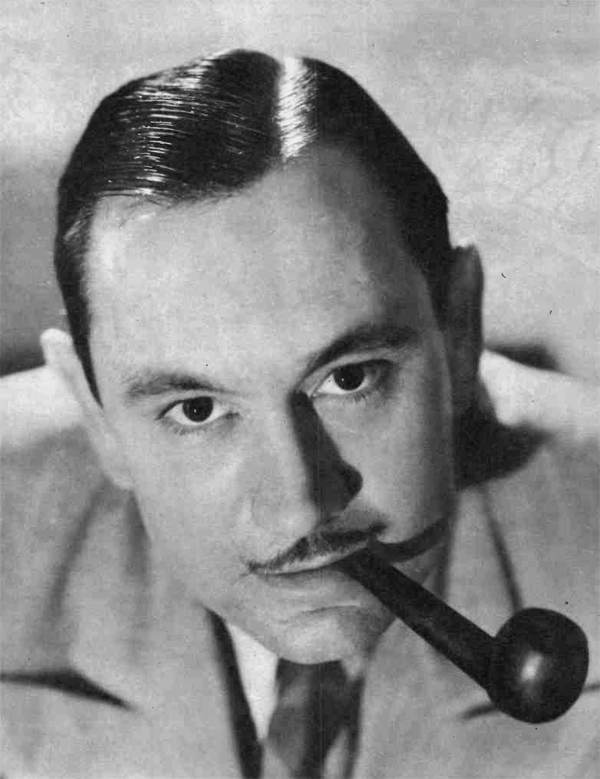
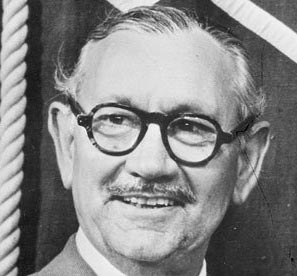
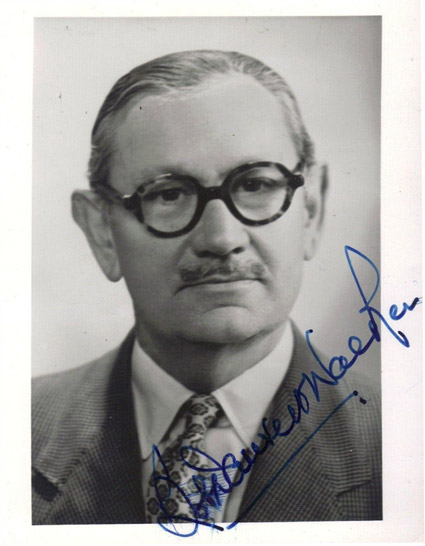
Oncle Bob en 1974
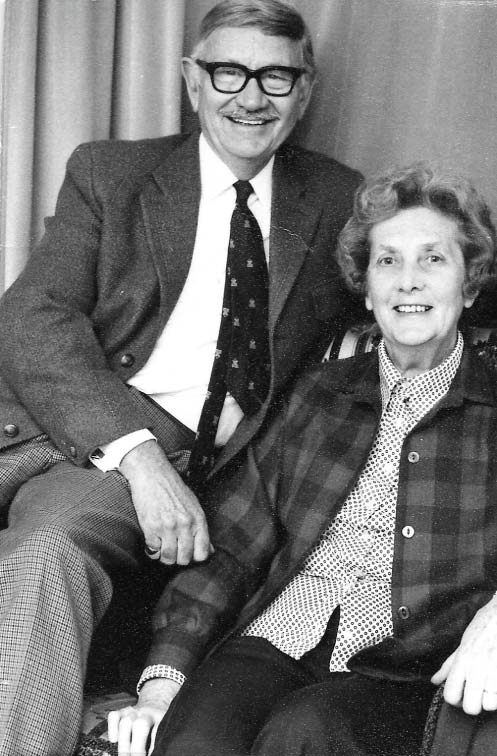
Bob et Vera Nita White
sa femme (1975)
| Philippe Slessor
L'un des hommes de radio les plus compétents, les plus lus et les plus stylés. A eu près de vingt ans d'expérience au micro, en commençant dans les stations continentales avant la guerre. Philip Slessor, producteur et annonceur sur Radio Normandie, participe à Radio International en 1939 mais sur sa demande, sera remplacé par Roy Plomley.
Adepte de l'art de l'annonce impromptue. Avec Gale Pedrick et Emlyn Griffiths, il s'envole en 1943 pour Alger pour mettre en place le service de radiodiffusion de l'armée des stations de radio mobiles pour les combattants en Afrique du Nord et en Italie. Vivement intéressé par le travail des "amateurs" - les "amateurs" qui gèrent leurs propres stations de radio.
|
Philip Slessor
One of the ablest, most widely-read and stylish men of radio. Has had nearly twenty years experience at the microphone, beginning in Continental stations before the war. Philip Slessor, producer and announcer on Radio Normandie, took part in Radio International in 1939 but, at his request, was replaced by Roy Plomley.
An adept in the art of impromptu announcing. With Gale Pedrick and Emlyn Griffiths, flew in 1943 to Algiers to set up the Army Broadcasting Service of mobile radio stations for fighting men in North Africa and Italy. Keenly interested in work of the ‘hams’ — the ‘amateurs’ who operate their own radio stations.
https://transdiffusion.org/2022/03/04/the-story-of-announcers-and-announcing-over-thirty-years/
| 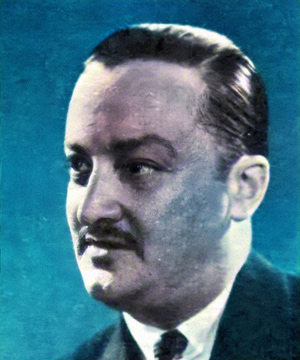
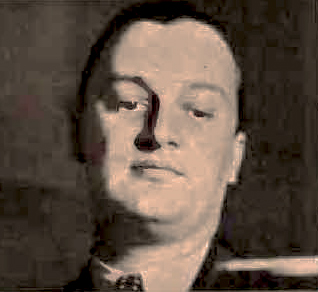
| Joe Murgatroyd (and “Popett”)
Comédiens, chanteurs, pianistes. Joe est né à Rotherham (Yorkshire), « Popett » à Londres. Bien connu pour leur «Petit-déjeuner avec les Murgatroyds». D'abord diffusés ensemble sur Radio Normandie dans les émissions quotidiennes « Rire et Grandir en forme », qui ont duré deux ans.
Joe était l'un des premiers comédiens de la BBC et en 1924, il était partenaire de feu John Henry. «Popett», sous le nom de Jose Bradly a composé de nombreuses chansons à succès, dont «Remember me» et «Sweet Dreams to You», tandis que Joe en écrit les paroles.
Entendre un court extrait dans les documents sonores plus bas
|
Joe Murgatroyd (and «Popett»)
Comedians, vocalists, pianists. Joe was born in Rotherham, «Popett» in London. Well known for their «Breakfast with the Murgatroyds». First broadcast together in commercial radio (Radio Normandy) in daily programmes «Laugh and Grow Fit», which ran for two years. Later with their two daughters broadcast from Bangor withe the BBC, their best known act being «Breakfast with the Murgatroyds».
Joe was one of the first batch of BBC comedians, and in 1924 was partner with the late John Henry. «Popett» under the name of Jose Bradly, has composed many song successes, including «Remember me» and «Sweet Dreams to You», while Joe helps out with the words.
https://worldradiohistory.com/BOOKSHELF-ARH/Enjoyment/Radio%20Whos%20Who%201947.pdf
|
 | Hilary Wontner
(4.10.1932-25.06.1984)
Hilary Arthur Wontner est né dans une famille théâtrale le 4 octobre 1912. Sa mère était l'actrice Rose Pendennis et son père le célèbre acteur anglais Arthur Wontner, surtout connu pour son interprétation du célèbre détective Sherlock Holmes. Il épousa Denise Judith Dean (née le 4 février 1915) à Kensington le 6 mai 1947.
Il a fait ses études à la Oundle School dans le Northamptonshire, avec son frère aîné Hugh (plus tard Sir Hugh Wontner, lord-maire de Londres). Hilary est ensuite allé à l'Université de Poitiers en France et est finalement retourné à Londres où il a étudié le théâtre à RADA, l'Académie Royale d'Art Dramatique.
Acteur à partir de 1933, il a été avec le Shakespeare Memorial Theatre à partir de 1935 puis la Birmingham Repertory Company de 1935 à 1937. À partir de 1938, il est apparu sur la scène londonienne et provinciale, et a eu des rôles à la radio et à la télévision à partir de 1938. Il est apparu à la télévision américaine. de 1962 à 1964.
Il devient annonceur pour "Radio Normandie" en 1938. Il rejoint ensuite la South African Broadcasting Corporation à Johannesburg, où il est annonceur, scénariste et producteur, puis devient assistant organisateur de programmes de 1950 à 1955.
Au déclenchement de la Seconde Guerre mondiale en 1939, il a servi dans la sécurité sur le terrain en France et en Belgique. Il a été évacué de Dunkerque en 1940. Plus tard, il a été affecté au 5e/6e régiment du Pendjab dans l'armée indienne, où il est devenu capitaine en 1942. Entre 1941 et 1943, il a servi en Birmanie, en Inde et en Irak. Il a été rédacteur en chef du journal de l'armée à Bagdad avant d'être détaché au British Council en Iran en 1943 où il a fondé l'Anglo-Iranian Dramatic Society en 1944.
À son retour en Angleterre en 1957, il devient administrateur de H. A. Wontner & Company.
Il avait deux jumeaux, nés de sa femme Denise le 18 décembre 1947. Rupert Stephen Arthur Wontner et Nicholas St. John Hilary Wontner, et les deux fils d'Hilary ont hérité le don de leur père pour les langues ainsi que ses cheveux roux ardents ! |
Hilary Wontner (4.10.1932-25.06.1984)
Hilary Arthur Wontner was born into a theatrical family on 4th October 1912. His mother was actress Rose Pendennis and his father the famous English actor Arthur Wontner, most notable for his portrayal of the famous detective Sherlock Holmes. He married Denise Judith Dean (b. 4 February 1915) in Kensington on the 6th May 1947.
He was educated at Oundle School in Northamptonshire, along with his elder brother Hugh (later Sir Hugh Wontner, Lord Mayor of London). Hilary then went to Poitiers University in France and finally returned to London where he studied acting at RADA, the Royal Academy of Dramatic Art.
An actor from 1933, he was with the Shakespeare Memorial Theatre from 1935 and then the Birmingham Repertory Company from 1935 to 1937. From 1938 he appeared on the London and provincial stage, and had radio and television roles from 1938. He appeared in US television from 1962 to 1964.
He became an announcer for 'Radio Normandy' in 1938. He subsequently joined the South African Broadcasting Corporation in Johannesburg, where he was an announcer, scriptwriter and producer, going on to become an assistant programme organiser from 1950 to 1955.
At the outbreak of World War Two in 1939, he served in Field Security in France and Belgium. He was evacuated from Dunkirk in 1940. Later he was posted to the 5th/6th Punjab Regiment in the Indian Army, where he became a Captain in 1942. Between 1941 and 1943 he served in Burma, India and Iraq. He was editor of the Army journal in Bagdad before being seconded to the British Council in Iran in 1943 where he founded the Anglo-Iranian Dramatic Society in 1944.
On his return to England in 1957 he became a director of H. A. Wontner & Company.
He had two twin boys, born to his wife Denise on the 18th December 1947. Rupert Stephen Arthur Wontner and Nicholas St. John Hilary Wontner, and both Hilary's sons inherited their fathers gift for languages as well as his fiery red hair!
| 
Hilary Wontner (1965)

| David (Ian) Newman, annonceur
(1916 - avril 2009)
fut engagé et commença ses fonctions à Fécamp puis Caudebec comme annonceur (chargé de l'enchaînement des programmes anglais enregistrés) de déc. 1936 au 7 sept. 1939 (dernier jour des émissions).
Une fois marié à Geneviève en 1939, David, retourne à Londres et s'engage dans la Royal Navy. Après avoir quitté la Marine, il intègre le ministère des Affaires étrangères dans le service diplomatique, puis devient interprète pour les ministres lors de nombreuses réunions de l'OTAN.
En 2007, notre site a eu le privilège d'échanger quelques lettres avec David Newman, lui aussi passionné de radio. Notre curiosité nous a conduit à le bombarder de multiples questions sur Radio Normandie, auxquelles il a cordialement accepté de répondre. Nous avons regroupé cette correspondance :En Lettres de David
Le 5 janvier 2008, David était l'invité de l'émission Archive Hour de BBC Radio 4 "God, Pirates and the Ovaltineys" où il a raconté quelques souvenirs de Radio Normandie. (cf notre chapitre Documents sonores)
|
David (Ian) Newman
(1916 - april 2009)
was hired and began his duties in Fécamp then Caudebec as an announcer (responsible for the sequence of recorded English programs) from Dec. 1936 to Sept. 7, 1939 (last day of the broadcasts).
Once married to Geneviève in 1939, David, back in London, was drafted into the Royal Navy. After leaving the Navy, he joined the Ministry of Foreign Affairs in the diplomatic service, then became an interpreter for ministers at numerous NATO meetings.
In 2007, our site had the privilege of exchanging a few letters with David Newman who was also passionate about Radio. Our curiosity led us to bombard him with multiple questions about Radio Normandie, which he cordially agreed to answer. We have grouped this correspondence together:
David's Letters
On January 5, 2008, David was a guest on BBC Radio 4's Archive Hour show 'God, Pirates and the Ovaltineys' where he recounted some memories of Radio Normandie.
(see our chapter Sound documents)
| 
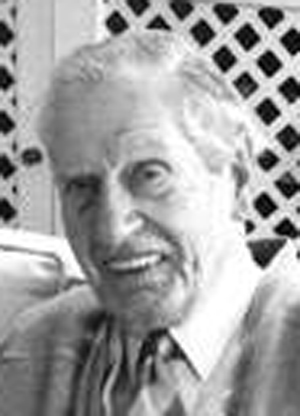
David en 2008
| Le capitaine Leonard Frank Plugge
(21 septembre 1889 - 19 février 1981)
était un homme d'affaires britannique et homme politique du parti conservateur.
Premières années et vie politique
Plugge a fait ses études à l'Université de Bruxelles et à l'University College de Londres, où il a obtenu un diplôme en génie civil en 1915. Pendant la Première Guerre mondiale, il a rejoint la Royal Naval Volunteer Reserve et en 1918, il a été transféré à la Royal Air Force, où il devenu capitaine. Il est resté dans l'armée de l'air jusqu'en 1921 et, la même année, a été élu membre de la Royal Aeronautical Society.
Plugge a été élu député de Chatham en 1935, battant le candidat travailliste Hugh Gaitskell par une majorité de 5 897 voix. Il perdit en 1945 face à Arthur Bottomley, futur ministre du Développement outre-mer dans la première administration de Harold Wilson.
Famille
Le capitaine Plugge était le fils unique de Frank Plugge (1864-1946), commis commercial, et de sa femme, Mary Chase (1862 - 1924). Son père était un Belge d'origine hollandaise. Il épousa (Gertrude) Ann Muckleston (13 janvier 1909-1993) à New York le 28 octobre 1935, un peu plus de deux semaines avant d'être élu à la Chambre des communes. Ils eurent trois enfants : Leonard Frank (né le 13 janvier 1937), Greville (4 novembre 1944-1973) et Gale Ann (4 novembre 1944-2 janvier 1972). Plugge et sa femme se sont séparés au début des années 1950.
Années offshore
Plugge a créé l'International Broadcasting Company le 12 mars 1930 en tant que rival commercial de la British Broadcasting Corporation en achetant du temps d'antenne à des stations de radio telles que Radios Normandie, Toulouse, Ljubljana, Juan-les-Pins, Paris, Poste Parisien, Athlone, Barcelone, Madrid et Rome. IBC a travaillé indirectement avec Radio Luxembourg jusqu'en 1936. La Seconde Guerre mondiale a fait taire la plupart des stations de Plugge entre 1939 et 1945.
Plugge était un passionné de radio et un pionnier des longs voyages en voiture sur le continent européen. Là, il collectait les horaires des stations de radio qu'il visitait et les vendait à la BBC pour les publier dans Radio Times et d'autres magazines tels que Wireless World. C'est lors d'un de ces voyages qu'il s'est arrêté pour prendre un café au Café des Colonnes de la place Thiers (aujourd'hui place du Général de Gaulle) dans le village côtier normand de Fécamp. Là, il demanda au cafetier ce qu'il y avait à voir dans la ville, et on lui répondit qu'un jeune membre de la famille Le Grand - qui possédait la distillerie Bénédictine de la ville - avait un petit émetteur radio derrière un piano dans sa maison, et que les affaires d'un cordonnier local avaient prospéré après qu'une émission ait mentionné son nom.
Plugge est allé voir Fernand Le Grand et lui a proposé d'acheter du temps d'antenne pour diffuser des programmes en anglais. Le Grand accepta et un studio fut installé dans le loft au-dessus des anciennes écuries de la rue George Cuvier, d'où les programmes étaient diffusés par les employés de Plugge. Le premier présentateur était un caissier de la succursale du Havre de la Banque nationale provinciale, que Plugge avait rencontré lors d'un retrait d'argent après avoir quitté Le Grand. Le caissier de banque devenu animateur William Evelyn Kingwell a accepté de se rendre à moto le dimanche pour présenter des disques.
Kingwell est tombé malade et Plugge a fait venir de nouveaux annonceurs, dont Max Stanniforth, Stephen Williams, plus tard Bob Danvers-Walker et le directeur général-présentateur David Davies, qui, après la guerre, est devenu directeur général de la chaîne de langue anglaise LM Radio (Radio Lourenco Marques), au Mozambique, de 1947 à 1969. Beaucoup d'autres ont rejoint Radio Normandy (la station a utilisé cette orthographe anglicisée dans sa littérature et sa publicité britanniques).
La puissance de l'émetteur a augmenté après que Plugge ait convaincu le propriétaire de la chaîne de cinéma Gaumont British, propriétaire du Sunday Referee, un journal du dimanche basé sur le divertissement, qui l'avait parrainé - et qui imprimait le programme de Radio Normandie.
Radio Normandie bénéficiait désormais d'une large audience aussi loin que le nord des Midlands anglais, grâce aux nombreux grands noms de l'époque. Parmi eux se trouvait Roy Plomley, célèbre par la suite pour avoir créé et présenté Desert Island Discs à la BBC.
Silencieux
Plugge émettait depuis Fécamp et plus tard depuis le nouvel émetteur et studio à Caudebec. La Seconde Guerre mondiale a commencé peu après l'ouverture du studio et, selon certaines histoires, les troupes allemandes ont envahi les émetteurs en 1940, les utilisant pour diffuser de la propagande en Grande-Bretagne jusqu'à ce que la RAF bombarde l'émetteur de Louvetot désormais hors service. Le site français L'Histoire de Radio Normandie* s'en souvient différemment : "Après la fermeture de l'émetteur de Louvetot en 1939 à cause de la guerre, IBC continua à émettre sous le nom de Radio International Fécamp depuis le premier émetteur de Radio Normandie à Fécamp pendant "plusieurs semaines". Le 10 juin 1940, les troupes françaises sabotent l'émetteur, la veille de l'invasion allemande.'
*Ndw : on parle de notre site, hé hé !
Une note du cabinet de guerre britannique du 22 octobre 1939 portant la mention
« SECRET : To Be Kept Under Lock And Key » note que :
On a appris qu'une station désuète de Fécamp, contrôlée par la Société internationale de radiodiffusion (dont le capitaine L. F. Plugge, député, est le président), a été modernisée et a commencé à fonctionner avec des programmes en anglais, tchèque et autrichien [sic]. Le danger de laisser une station si proche de la Manche fonctionner sans aucun contrôle, a été ressenti par le Ministère de l'Air comme préoccupant. Les Services français sont en parfait accord avec le point de vue britannique... [et] ont avoué que les intérêts privés concernés ont prévalu et n'ont pas pris en compte les facteurs de sécurité nationale. On espère que le point de vue des Services français l'emportera sous peu.
Il semble que le gouvernement britannique n'était pas intéressé par l'invitation de Plugge de diffuser une propagande alliée à partir des émetteurs de Radio Normandie, même s'ils n'avaient pas été (encore) détruits.
Plugge espérait redémarrer les émissions depuis la France après la guerre, mais l'instauration du monopole d'état de la radiodiffusion signifiait que cela ne serait plus possible. Le président d'après-guerre, Charles de Gaulle avait une attitude différente vis-à-vis des radios commerciales.
Radio Normandie avait une plus grande audience dans le sud de l'Angleterre le dimanche que la BBC. Sous Lord Reith, la BBC faisait relâche le dimanche pour donner aux gens le temps d'aller à l'église, et offrait peu de musique. Les historiens de la radiodiffusion ont déclaré que Reith avait accepté à contrecœur de rendre les programmes de la BBC moins rébarbatifs le dimanche, après l'abandon du public beaucoup plus attiré par la musique légère de Radio Normandie. C'est, selon certains, une raison pour laquelle Reith a quitté la BBC, sentant que sa mission d'éduquer, d'informer et de divertir avec ce qu'il jugeait être des programmes de haute moralité avait été remplacés par des divertissements commerciaux plus motivés par l'argent.
Les bureaux londoniens d'origine de l'IBC se trouvaient à Hallam Street, près de la BBC, puis ont déménagé au 35-36 Portland Place, à proximité. Celui-ci a été repris par une unité britannique de développement d'armes MRI (c) au début de la guerre, mais plus tard bombardé. BBC Radio 1, héritière des audiences que les stations offshore avaient constitué jusqu'à ce que la loi anti-pirate de 1967 les rende illégales, a ensuite emménagé dans le bâtiment de Hallam Street. Après la guerre, IBC est devenu un studio d'enregistrement et des stars telles que The Who, The Kinks, The Rolling Stones et Jimi Hendrix y ont enregistré.
Il a été suggéré que Leonard Plugge était l'inventeur du radiotéléphone de voiture bidirectionnel. On prétend également que le terme "brancher" quelque chose par la publicité est dérivé du nom de Leonard Plugge (to plug). Plugge a prononcé son nom "Plooje", revendiquant des origines flamandes. Ce n'est que lorsqu'il s'est présenté pour le siège parlementaire de Chatham qu'il a accepté le slogan "Branchez-vous pour Chatham" et a accepté la façon dont tout le monde prononçait son nom.
La vie plus tard
Dans les années 1960 et 1970, Plugge a cotoyé le milieu social qui comprenait la princesse Margaret, son mari le photographe Anthony Armstrong-Jones, le journaliste TV Julian Pettifer et la personnalité transgenre April Ashley.
La fille de Plugge, Gale Ann, qui avait épousé et divorcé de Jonathan Benson, se trouvait à Trinidad avec son partenaire, Hakim Jamal, leader américain du mouvement Black Power, lorsqu'elle a été frappée à coups de machette et enterrée vivante en janvier 1972 par Michael X et ses partisans. Son frère jumeau, Greville, est mort dans un accident de la route au Maroc un an plus tard.
Le film Performance, avec Mick Jagger et James Fox, a été tourné dans la maison de Plugge à Lowndes Square. Plugge a déménagé à Hollywood, en Californie, en 1972, et y est décédé le 19 février 1981 à l'âge de 91 ans.
Étymologie de "Plug" [brancher]
Dans son livre Red Herrings and White Elephants, le linguiste Albert Jack écrit que Plugge a partiellement financé Radio Normandie en recevant des paiements pour diffuser et promouvoir des disques, ce qui est probablement à l'origine du verbe "brancher" un disque. Cependant, l'Oxford English Dictionary contredit cette suggestion.
|
Captain Leonard Frank Plugge
(21 September 1889 – 19 February 1981)
was a British businessman and
Conservative Party politician.
Early years and political life
Plugge was educated at the University of Brussels and University College London, where he graduated with a degree in civil engineering in 1915. In the First World War, he joined the Royal Naval Volunteer Reserve and in 1918 transferred to the Royal Air Force, where he became a captain. He stayed with the air force until 1921, and in the same year was elected a Fellow of the Royal Aeronautical Society.
Plugge was elected Member of Parliament (MP) for Chatham in 1935, defeating the Labour candidate Hugh Gaitskell by a majority of 5,897 votes. He lost in 1945 to Arthur Bottomley, a future Minister of Overseas Development in Harold Wilson's first administration.
Family
Captain Plugge was the only son of Frank Plugge (1864–1946), a commercial clerk, and his wife, Mary Chase (1862–1924). His father was a Belgian of Dutch descent. He married (Gertrude) Ann Muckleston (13 January 1909–1993) in New York on 28 October 1935, a little over two weeks before he was elected to the House of Commons. They had three children: Leonard Frank (b. 13 January 1937), Greville (4 November 1944–1973) and Gale Ann (4 November 1944–2 January 1972). Plugge and his wife separated in the early 1950s.
Offshore years
Plugge created the International Broadcasting Company on 12 March 1930 as a commercial rival to the British Broadcasting Corporation by buying airtime from radio stations such as those of Normandy, Toulouse, Ljubljana, Juan-les-Pins, Paris, Poste Parisien, Athlone, Barcelona, Madrid and Rome. IBC worked indirectly with Radio Luxembourg until 1936. World War II silenced most of Plugge's stations between 1939 and 1945.
Plugge was a radio enthusiast and a pioneer of long motoring holidays on the European continent. There he would collect the schedules of radio stations he visited and sell them to the BBC to publish in Radio Times and other magazines such as Wireless World. It was on one such journey that he stopped for coffee at the Café Colonnes in the Place Thiers (now the Place Général de Gaulle) in the Normandy coastal village of Fécamp. There, he asked the café owner what there was to see in the town, and was told that a young member of the Le Grand family – which owned the town's Benedictine distillery – had a small radio transmitter behind a piano in his house, and that a local cobbler's business had increased after a broadcast mentioned his name.
Plugge went to see Fernand Le Grand and offered to buy time to broadcast programmes in English. Le Grand agreed, and a studio was set up in the loft over the old stables in rue George Cuvier, from which the programmes were broadcast by Plugge's employees. The first presenter was a cashier from the National Provincial Bank's Le Havre branch, whom Plugge had met when drawing cash after leaving Le Grand. Bank teller turned broadcaster William Evelyn Kingwell agreed to motorcycle over on Sundays to introduce records.
Kingwell fell ill and Plugge brought in new announcers, including Max Stanniforth and Stephen Williams, and later Bob Danvers-Walker and general manager-cum-presenter David Davies, who, after the war, became managing director of the English-language 'offshore' broadcaster, LM Radio (Radio Lourenco Marques), Mozambique, from 1947 to 1969. Many others joined during the life of Radio Normandy (the station used this anglicised spelling in its British literature and advertising).
The power of the transmitter increased after Plugge convinced film studio cinema chain owner Gaumont British, owner of the Sunday Referee, an entertainment-based Sunday newspaper, which had sponsored him – and which printed Radio Normandy's schedule.
Radio Normandy by now had a large audience as far north as the English Midlands, and many big names of the day. Among them was Roy Plomley, later famous for creating and presenting Desert Island Discs for BBC radio.
Silenced
Plugge broadcast from Fécamp and later from a new transmitter and studio at Caudebec. World War II began soon after the studio opened and, according to some histories, German troops overran the transmitters in 1940, using them to broadcast propaganda to Britain until the RAF bombed the Louvetot transmitter now out of action. The French website L'Histoire de Radio Normandie remembers it differently: "After the Louvetot transmitter closed in 1939 because of the war, IBC went on broadcasting under the name Radio International Fécamp from Radio Normandie's first transmitter at Fécamp for "several weeks". On 10 June 1940 French troops sabotaged the transmitter on the eve of the German invasion.'
A 22 October 1939 British War Cabinet memo marked 'SECRET: To Be Kept Under Lock And Key' notes that:
It was learnt that an obsolete station at Fécamp, controlled by the International Broadcasting Company (of which Captain L. F. Plugge, MP, is the chairman), has been modernised, and had started to work with programmes in English, Czech and Austrian [sic]. The danger of allowing a station so near the Channel to work on its own...was felt by the Air Ministry to be grave. The French Service(s) are in complete agreement with the British point of view...[and] have confessed that the private interests concerned have got the ear of the civil powers [in France] without reference to factors of national security. It is hoped that the French Service view will shortly prevail.
It seems that the British government was not interested in Plugge's invitation to broadcast Allied propaganda from the Radio Normandie transmitters, even though they had not (yet) been destroyed.
Plugge hoped to restart transmissions from France after the war but changes in French broadcasting regulations and a different attitude to radio listening meant that this never happened. The post-war president, Charles de Gaulle had a different attitude to the commercial radios.
Radio Normandy had a bigger audience in southern England on Sundays than the BBC. Under Lord Reith, the BBC was silent on Sundays to give people time to go to church, and offered little music. Broadcasting historians have said that Reith reluctantly agreed to lighten the BBC's programmes on Sundays after his audience deserted him for Radio Normandy's light music. That, some have said, was a reason that Reith left the BBC, feeling his mission to educate, inform and entertain with what he judged to be programmes of high moral tone had been cut away by rank commercial entertainment driven by money.
The IBC's original London offices were in Hallam Street, near the BBC's Broadcasting House, then moved to nearby 35-36 Portland Place. This was taken over by a British weapons development unit MRI(c) at the start of the war but later bombed. The BBC's Radio 1, inheritor of the audiences that Plugge's offshore successors had built until the 1967 Marine Broadcasting (Offences) Act made them illegal, later moved into the Hallam Street building. After the war IBC became a recording studio and stars including The Who, The Kinks, The Rolling Stones and Jimi Hendrix recorded there.
It has been suggested that Leonard Plugge was the inventor of the two-way car radiotelephone. It is also claimed that the term of "plugging" something by advertising was derived from the name of Leonard Plugge. Plugge pronounced his name "Plooje", claiming Flemish origins. It was only when he stood for the parliamentary seat of Chatham that he agreed to the slogan "Plugge in for Chatham" and accepted the way everybody else pronounced his name.
Later life
In the 1960s and 1970s, Plugge moved in a social set that included Princess Margaret, her husband photographer Anthony Armstrong-Jones, broadcaster Julian Pettifer and transsexual April Ashley.
His daughter Gale Ann, who had married and divorced Jonathan Benson, was in Trinidad with her partner, the American Black Power leader Hakim Jamal, when she was hacked to death with machetes and buried alive in January 1972 by Michael X and his supporters. Her twin brother, Greville, died in a road accident in Morocco a year later.
The film Performance, starring Mick Jagger and James Fox, was filmed in Plugge's house in Lowndes Square. Plugge moved to Hollywood, California in 1972, and died there on 19 February 1981 at the age of 91.
Etymology of "to plug"
In his book Red Herrings and White Elephants, the English language researcher Albert Jack writes that Plugge partially financed Radio Normandy by receiving payments to play and promote records, which is probably the origin of the verb to "plug" a record. However, the Oxford English Dictionary contradicts this suggestion.
| 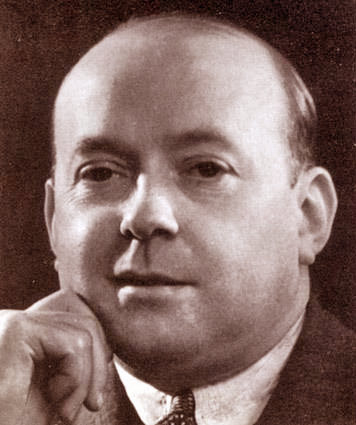
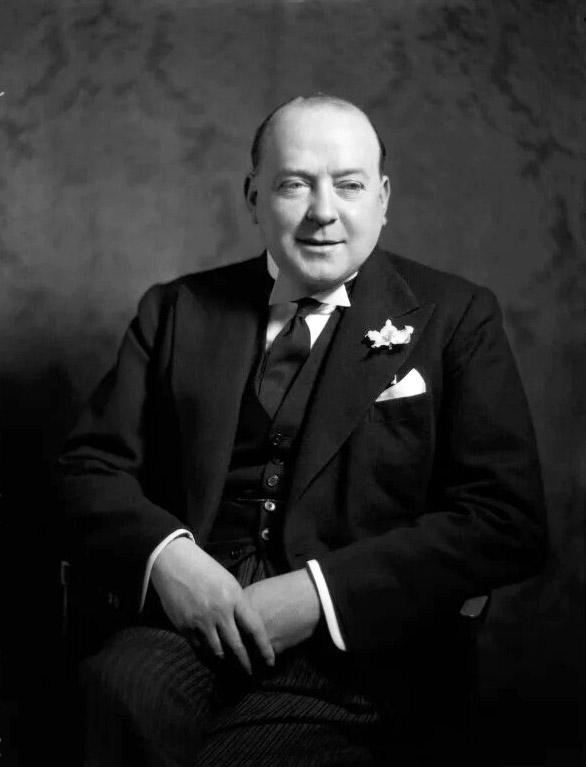
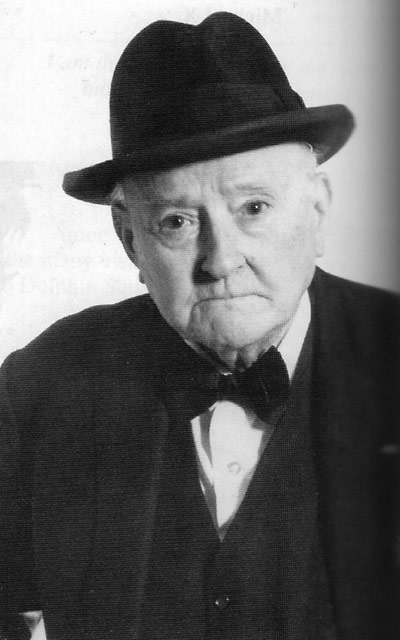
| George Shanks
George Shanks (1896 - 1957) seul enfant d'Henry Shanks, laissera une marque significative dans l'histoire britannique par son travail de traducteur et son travail de pionnier à Radio Normandie.
George a été l'un des fondateurs de Radio Normandie. En 1939, Radio Normandy a fermé ses portes après avoir échoué à convaincre le War Office qu'elle avait un rôle à jouer dans l'effort de guerre. [Radio International Fecamp]
L'anecdote suivante est racontée par Roger Bickerton (archiviste d'émissions radiophoniques) : "En 1932, Radio Normandie avait besoin de quelque chose de positif pour convaincre les annonceurs que nos auditeurs pouvaient constituer un véritable marché. L'idée est venue d'un associé de Plugge, un certain George Shanks ... [il] est tombé sur une recette d'une crème embellissante pour le visage.
Pour s'amuser, il est allé chez le pharmacien, a acheté les ingrédients et les a préparés sur la gazinière de l'arrière cuisine chez sa mère [Emilie Shanks] au n° 10, Great Stanhope Street - l'une des rues les plus chics de Mayfair. Plugge apporte 2 pots de ce truc - pourrais-je en faire la publicité sur Radio Normandie ? Elle s'appellera "Renis Face Cream" de Classic Beauty Preparations. Max Staniforth (un des premiers animateurs de RN) qui était avec moi, était un bon érudit classique, et nous avons inventé l'histoire d'une belle princesse persane... Bien que sa recette fût perdue, celle-ci venait d'être redécouverte, analysée et le contenu affiné. Le produit était désormais disponible pour les dames de Grande-Bretagne dans des pots en verre rose au prix de 2s. 3d. (6 €) chacun, port gratuit.
Une terrible querelle domestique s'en est suivie avec la mère de Shanks, car la crème s'est vendue et vendue et la cuisine encombrée ne pouvait plus faire face. Alors Plugge a dû confier la fabrication à un industriel. C'est ce qui a convaincu le milieu publicitaire des possibilités de la radio pour provoquer les ventes."
|
George Shanks
George Shanks (1896 - 1957) was the only child of Henry Shanks. By 1918, when it became clear that the Shanks famly had lost its Moscow businesses, George was 22 years of age. His calling in life had been lost and George was seeking a new direction. In 1919 George commissioned the Shanks family tree and coat of arms. This contrived English aristocratic heritage suggests that George was seeking a new identity having lost his Russian home and business. In spite of this, George was to leave a significant mark on British history through his work as a translator and his pioneering work at Radio Normandy.
George was one of the founders of Radio Normandy. In 1939 Radio Normady closed down after failing to convince the War Office that it had a role in contributing to the war effort.
The following story is recounted by Roger Bickerton: In 1932 Radio Normandy "needed something positive to convince advertisers that our listeners could constitute a genuine market. The breakthrough came from an associate of Plugge's, one George Shanks ... [he] came across a recipe for a face beautifying cream.
As a matter of fun, he went to the chemist, bought the ingredients and cooked it up on the gas stove in the back kitchen of his mother's house [Emilie Shanks], no. 10, Great Stanhope Street - one of the poshest streets in Mayfair, bombed out of existence in the war. Along comes Plugge to me with 2 pots of this stuff - could I advertise it? It was called Renis Face Cream by Classic Beauty Preparations Max Staniforth, who was still with me, was a good classical scholar, and we made up a story together about a beautiful Persian Princess.... and although its recipe had been lost, it had recently been rediscovered, analysed and the contents refined. It was now available to the ladies of Britain in pink glass pots at 2s. 3d. (11 p.) each, post free from 10, Great Stanhope Street.
This caused a terrible domestic row with Shanks' mother, as it sold and sold and the kitchen couldn't cope with it, so Plugge had to put it out to a proper chemist. That's what convinced the advertising fraternity that radio could sell."
Having been born in Moscow, George, like his sibilings, spoke Russian. In 1920 he anonomously translated the notorious publication known as The Protocols of Zion. Until 1978 this translation was attributed to Victor E. Marsden. George is known to have engaged in a dispute with the magazine 'The Britons' over payment of the royalties to which he was entitled regarding their publication of The Jewish Peril.
https://www.shanks-family.org/henry-and-george
https://www.monocledmutineer.co.uk/pdfs/George_Shanks_
the_Protocols_of_the_Elders_of_Zion_Jewish_Peril.pdf
(George Shanks : page 159)
| 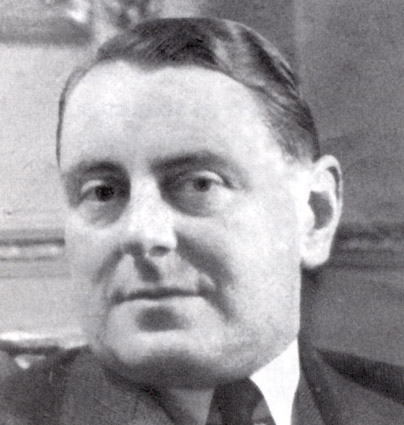
| Charles Chalmers Maxwell
(1er septembre 1910 - 4 août 1998)
était un producteur de radio britannique qui a produit des émissions pour la BBC.
Maxwell est né en Écosse et après avoir fréquenté l'Académie d'Édimbourg, il est allé à l'université pour étudier le droit et s'est qualifié comme avocat. Cependant, il abandonna bientôt la loi pour une carrière dans le show business.
En 1936, Maxwell rejoint Radio Luxembourg en tant qu'annonceur. Un de ses travaux était de lire des commentaires sur le cricket.
Après 18 mois à Radio Luxembourg, Maxwell est allé à l'équipe rivale, Radio Normandie, où il a rencontré et noué une amitié avec leur meilleur annonceur, Roy Plomley. Comme Roy l'a rappelé "Ni Charles ni moi n'avions la moindre connaissance ou intérêt pour le cricket, c'était un processus laborieux." Maxwell retourne en Grande-Bretagne en 1938 pour travailler pour la société mère de Radio Normandie, l'International Broadcasting Company (IBC). Avec le déclenchement de la Seconde Guerre mondiale, IBC a créé Radio International Fécamp et Maxwell a travaillé comme l'un des présentateurs jusqu'à ce que la station cesse d'émettre en janvier 1940.
Après un bref service dans la Royal Air Force, Maxwell a rejoint la BBC. En 1966, Maxwell a été nommé producteur en chef de Light Entertainment à BBC Radio 4. Maxwell a pris sa retraite en 1970 et est décédé le 4 août 1998. |
Charles Chalmers Maxwell
(1 September 1910 – 4 August 1998)
was a British radio producer who produced shows for the BBC.
Maxwell was born in Scotland and after attending Edinburgh Academy, went to university to study law and qualified as a solicitor. However he soon abandoned the law for a career in show business.
In 1936 Maxwell joined Radio Luxembourg as a station announcer. One of his jobs was to read out commentary on English Test cricket.
After 18 months at Radio Luxembourg, Maxwell went to rival team, Radio Normandie, where he met and befriended their top announcer, Roy Plomley. As Roy recalled "Neither Charles nor I had any knowledge or interest in cricket, it was a laborious process." Maxwell returns to Britain in 1938 to work for Radio Normandie's parent company, the International Broadcasting Company (IBC). With the outbreak of World War II, IBC created Radio International Fécamp and Maxwell worked as one of the presenters until the station ceased broadcasting in January 1940.
After brief service in the Royal Air Force, Maxwell joined the BBC. In 1966 Maxwell was appointed as Chief Producer of Light Entertainment at BBC Radio 4. Maxwell retired from the BBC in 1970 and died
on August 4 1998
| 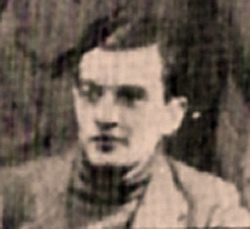
| George R. Busby (Responsable d'antenne)
né le 5 février 1900 à Nice (France).
Il est décédé en janvier 1997 dans le Staffordshire.
Jusqu'à juin 1939 : chef d'antenne, directeur à Fécamp et Caudebec
Par la suite, il devient producteur de cinéma. George Busby a réalisé des films dont "Les chaussons rouges" |
George R. Busby (IBC Studio manager Head of antenne)
born February 5, 1900 in Nice (France).
He died on January 1997 in Staffordshire.
Until june 1939 : head of antenne,
director in Fécamp and Caudebec
Subsequently, he became a film producer.
George Busby has made films including "The Red Shoes"
| 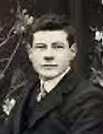
|
David J. Davies (Chef des animateurs)
né en 1915, David Davies a été directeur de la station de radio LM de 1947, date à laquelle elle a commencé à diffuser des émissions commerciales jusqu'à sa retraite en Angleterre en 1969. Il a fait ses débuts dans la radiodiffusion lorsqu'il était jeune dans les années 1930, travaillant pour Radio Luxembourg dont les programmes étaient fournis par l'International Broadcasting Company ( IBC) de Londres. À la fin des années 1930, David devint animateur en chef de Radio Normandy, une station de langue anglaise détenue et exploitée en France par l'IBC. Lorsque la France est envahie par l'Allemagne, le personnel de Radio Normandie est évacué et David rejoint la Royal Air Force. Il a été profondément impliqué dans la radio des forces britanniques dans tout le Moyen-Orient et a contribué au développement de stations dans des villes comme le Caire et Beyrouth. En 1947, le colonel Richard Meyer de Davenport et Meyer Pty Ltd, la société de gestion récemment nommée de LM Radio, proposa à David Davies le poste d'annonceur en chef et de directeur de la station, basé à Lourenço Marques. David a eu la particularité d'être le premier animateur de radio commerciale en Afrique australe. Il est devenu connu sous le nom de Mr LM Radio car c'est David qui a développé le style de musique distinctif et populaire pour lequel la station était connue. On se souviendra probablement surtout de David pour son "Your LM Hit Parade" du dimanche soir et pour son message de clôture de la soirée sur l'air de Goodnight Waltz. Il a présenté de nombreuses émissions diffusées au fil des années. Dans les années soixante, outre la programmation du dimanche soir, David a également présenté "In the Mood" et co-animé "Special Occasion" avec Evelyn Martin. Il était un maître des tâches difficiles et attendait l'excellence de son personnel. C’est grâce à son dynamisme et à son inspiration que LM Radio a prospéré et est devenue un modèle de diffusion de radio musicale. David s'est assuré que LM suivait le rythme des meilleures stations pop du monde. Il visitait des stations aux États-Unis et en Australie pour voir comment cela se faisait là-bas. C'est à l'instigation de David que LM a utilisé pour la première fois des jingles en 1964. Ceux-ci ont été produits et enregistrés par Dan Hill à Johannesburg. Plus tard, David a fait fabriquer des jingles aux États-Unis par la société Pepper Tanner, basée à Memphis. Celles-ci étaient régulièrement mises à jour et furent entendues sur la station jusqu'au début des années 1970. De nombreux annonceurs qui ont débuté sur LM Radio ont ensuite connu une carrière réussie en Afrique du Sud et à l'étranger, ce qui en dit long sur le niveau de formation qu'ils ont suivi. Après avoir pris sa retraite de la radiodiffusion, David et sa femme Brenda sont retournés en Angleterre, son pays de naissance où il a passé ses dernières années. Il est décédé d'un cancer au Royaume-Uni le 17 janvier 1974, à l'âge de 59 ans. Cette annonce est tirée de l'album "David Davies' Teen Beat Party", sorti en 1964.
|
David J. Davies (Chief announcer)
David Davies was the LM Radio Station manager from 1947 when it began commercial broadcasting until he retired to England in 1969. He cut his teeth in broadcasting as a young man in the 1930's working for Radio Luxembourg whose programmes were provided by the International Broadcasting Company (IBC) of London. In the later part of the 1930's David became chief announcer on Radio Normandy which was an English language station owned and operated in France by the IBC. When France was invaded by Germany, Radio Normandy staff were evacuated and David joined the Royal Air Force. He was deeply involved in British Forces Radio throughout the Middle East and helped develop stations in cities such as Cairo and Beirut. In 1947, Colonel Richard Meyer of Davenport and Meyer Pty Ltd, the recently appointed management company for LM Radio, offered David Davies the job of chief announcer and station manager, based in Lourenco Marques. David had the distinction of being the first commercial radio announcer in Southern Africa. He became known as Mr LM Radio for it was David who developed the distinctive and popular music style for which the station was known. David will probably be remembered most for his Sunday night "Your LM Hit Parade" and for his evening closing message to the tune of the Goodnight Waltz. He presented many of the programmes aired over the years. In the sixties, apart from the Sunday night line-up, David also presented "In the Mood" and co-hosted "Special Occasion" with Evelyn Martin. He was a hard task master and expected excellence from his staff. It was through his drive and inspiration that LM Radio flourished and became a model for music radio broadcasting. David made sure that LM kept up with the best pop stations in the world. He would visit stations in the USA and Australia to see how it was being done over there. It was at David's instigation that LM first used jingles in 1964. These were produced and recorded by Dan Hill in Johannesburg. Later David had jingles made in the USA by Memphis based Pepper Tanner company. These were regularly updated and were heard on the station until the early 1970's. Many announcers who started out on LM Radio went on to have successful careers in South Africa and abroad, which says a lot for the standard of training they had. After retiring from broadcasting, David and his wife Brenda returned to England, his country of birth where he spent his final years. He died of cancer in the UK on 17 January 1974, aged 59. This announcement is from the album "David Davies' Teen Beat Party", released in 1964. |

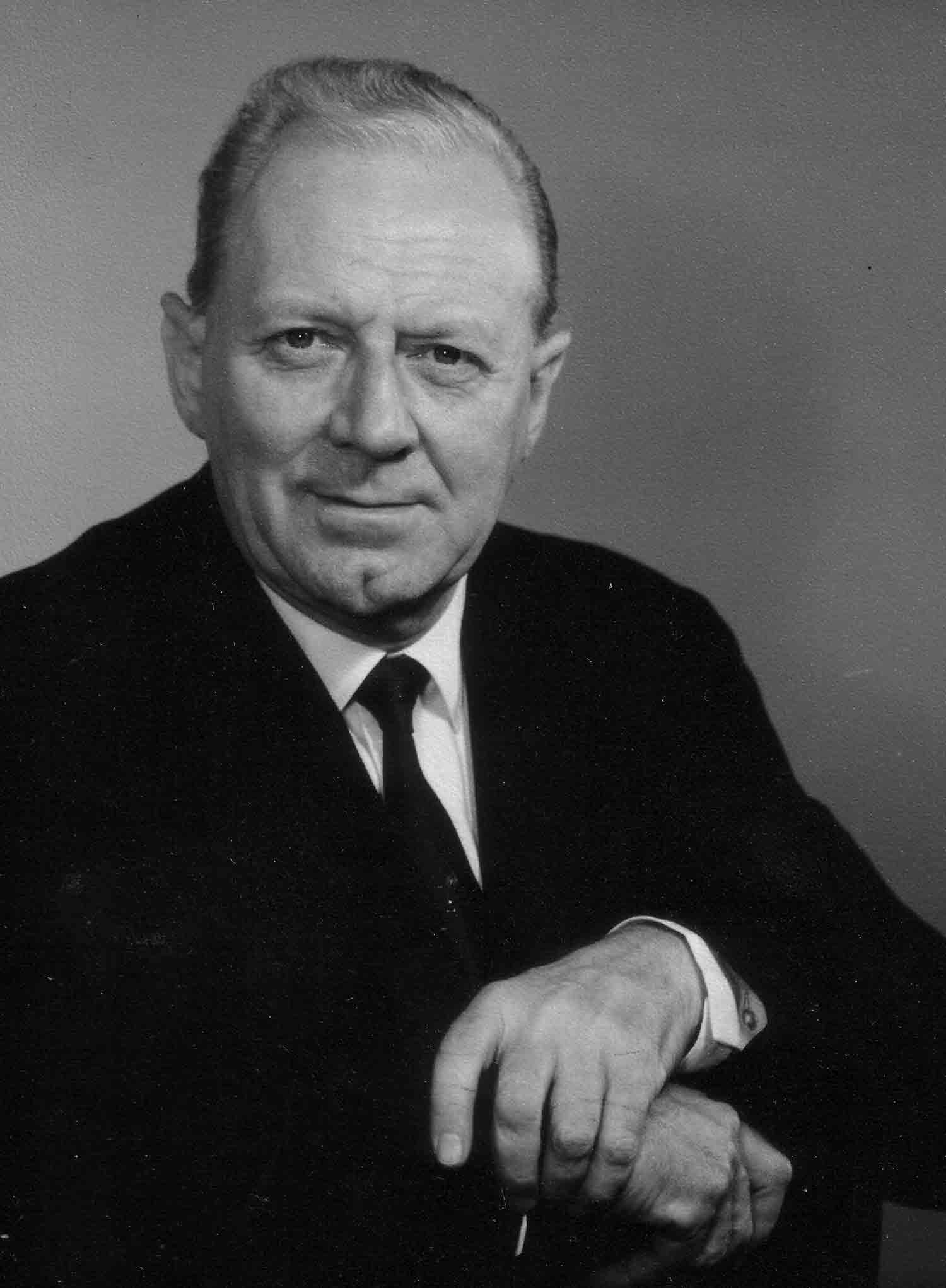
|
|
 >
arrivée de
Ralph Hurcombe
(de janvier 1939 au 8 septembre 1939)
>
arrivée de
Ralph Hurcombe
(de janvier 1939 au 8 septembre 1939) >
arrivée de
Godfrey Holloway
(du 12 février 1939 au 8 septembre 1939)
>
arrivée de
Godfrey Holloway
(du 12 février 1939 au 8 septembre 1939)






 >
> 

 >
> 



 >
> 
 >
> 



























